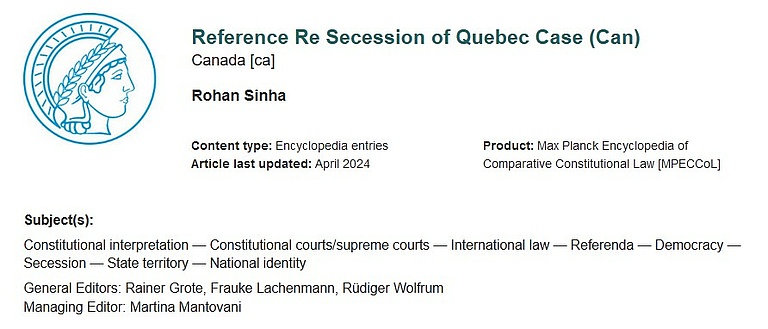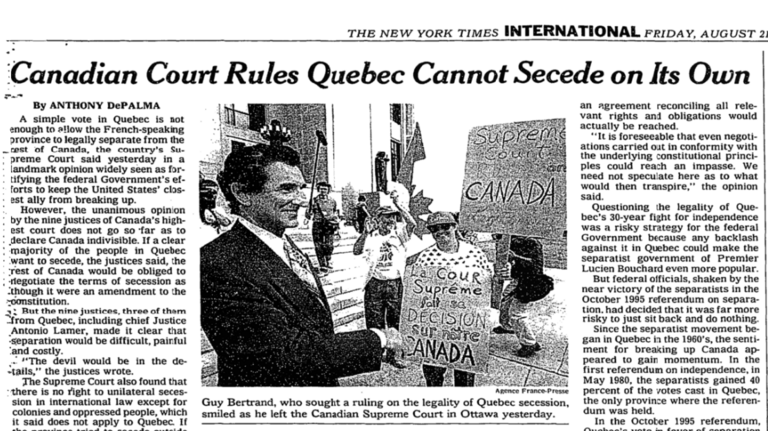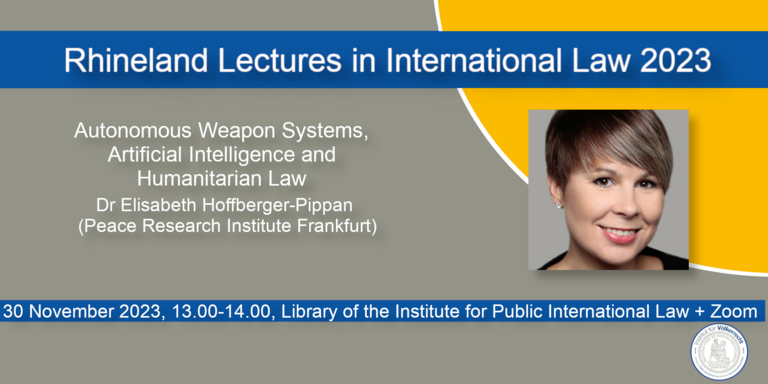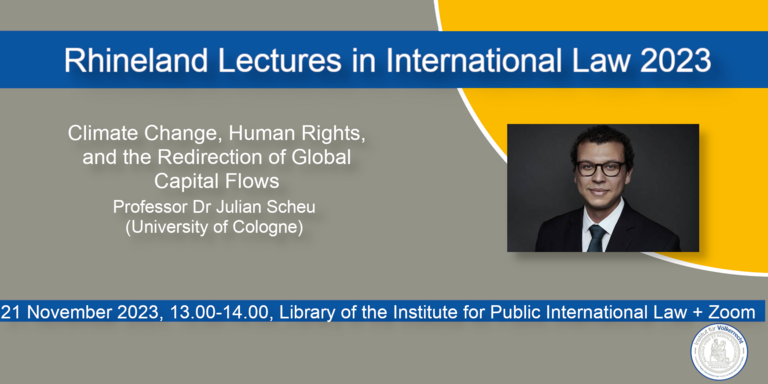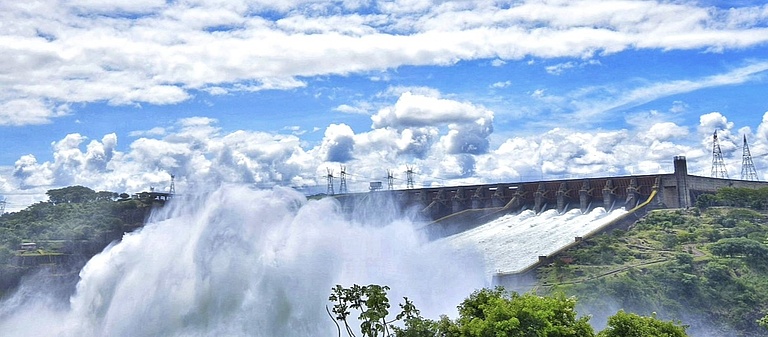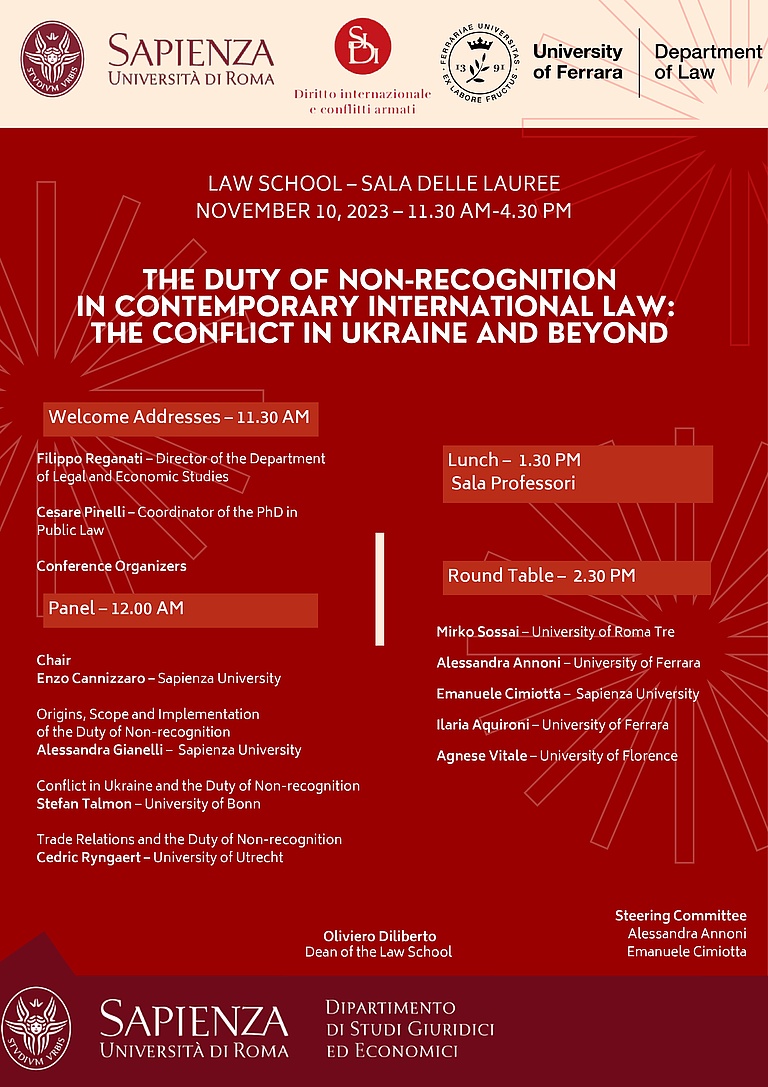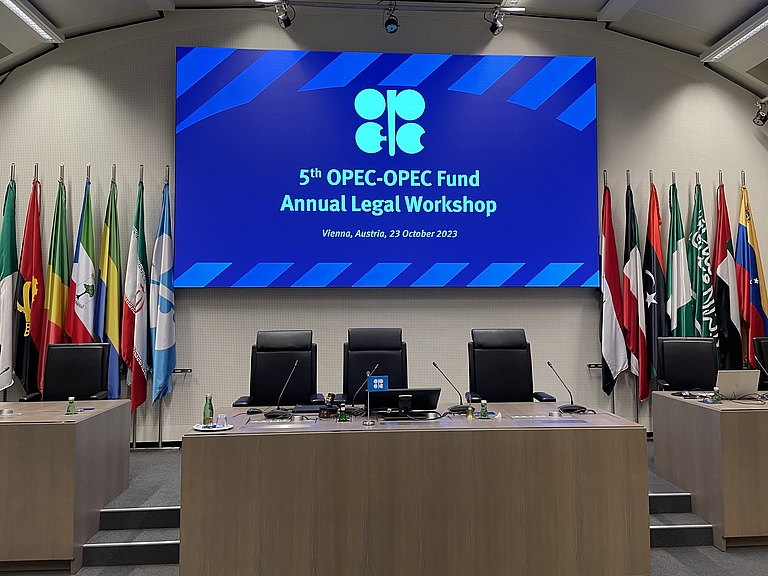Aktuelle Nachrichten aus dem Institut/News from the Institute
Ausschreibungen: Studentische Hilfskräfte (m/w/d)
Das Institut für Völkerrecht sucht zum Oktober 2025 zwei studentische Hilfskräfte. Hierbei ist eine der Stellen zur Unterstützung der regulären Institutsarbeit vorgesehen, die andere Stelle ist dem Projekt "German Practice in International Law" angegliedert. Nähere Informationen entnehmen Sie der Ausschreibung.
Dritter Lehrpreis für Dr. Julian Hettihewa
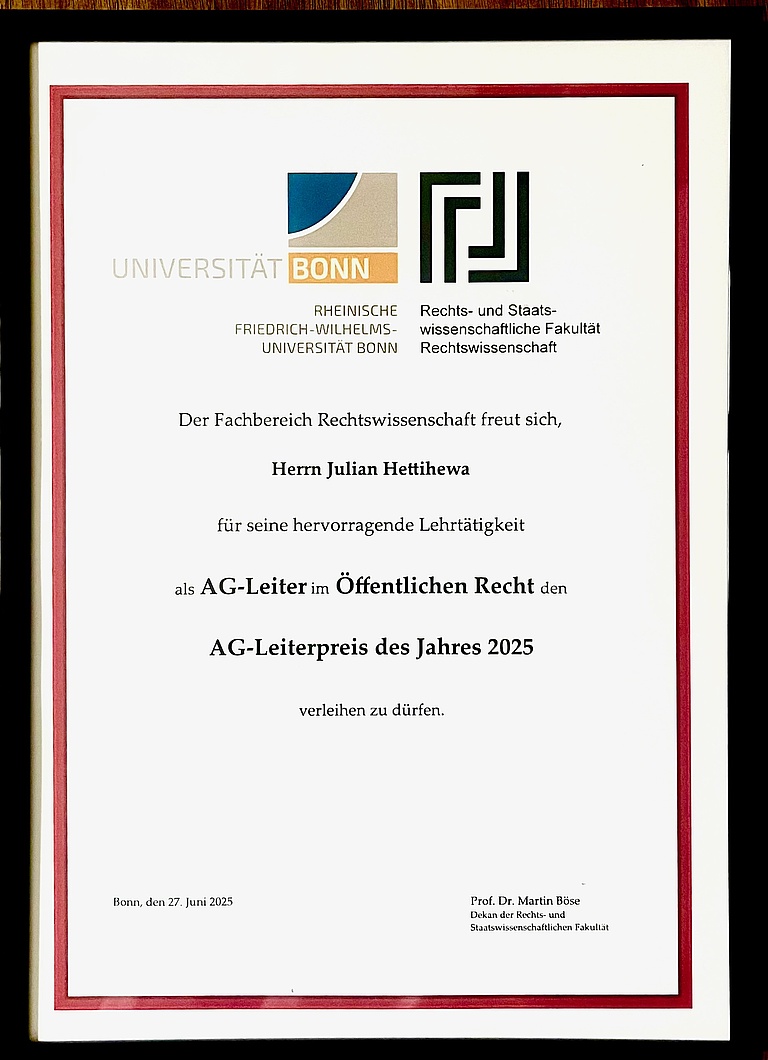
Dr. Julian Hettihewa, ehemaliger Doktorand und Mitarbeiter des Instituts für Völkerrecht, wurde mit dem AG-Leiterpreis des Jahres 2025 ausgezeichnet. Ausgangspunkt für die Verleihung des Preises an Dr. Hettihewa waren seine hervorragenden Evaluationsergebnisse in beiden Arbeitsgemeinschaften.
Für Dr. Hettihewa ist es bereits der dritte Lehrpreis. Das Institut gratuliert herzlich zu diesem Erfolg!
Rhineland Lecture in International Law: "Weltraumbergbau? Das Völkerrecht und die Nutzung von Ressourcen auf Himmelskörpern"
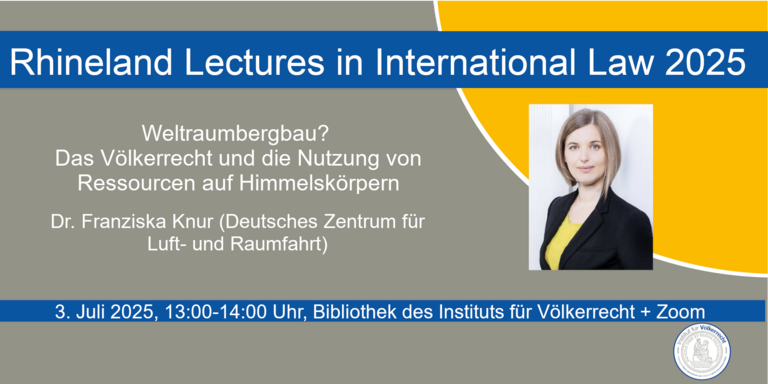
Das Institut für Völkerrecht freut sich, zur Rhineland Lecture in International Law von Frau Dr. Franziska Knur (Deutsches Zentrum für Luft- und Raumfahrt) zum Thema "Weltraumbergbau? Das Völkerrecht und die Nutzung von Ressourcen auf Himmelskörpern" einladen zu dürfen. Die Veranstaltung wird am 3. Juli 2025 von 13:00-14:00 Uhr in der Bibliothek des Instituts für Völkerrecht (Ostturm, 4. Stock) stattfinden. Im Anschluss wird ein kleiner Kaffeeempfang die Möglichkeit bieten, ins Gespräch zu kommen. Eine Teilnahme per Zoom ist unter folgenden Einwahldaten ebenfalls möglich:
https://uni-bonn.zoom-x.de/j/65108098270?pwd=8eao3HSesl1nbQuKCWeZ7XhUTuFfyG.1
Meeting-ID: 651 0809 8270
Kenncode: 9384
A busy month of June for Dr. Maria A. Gwynn
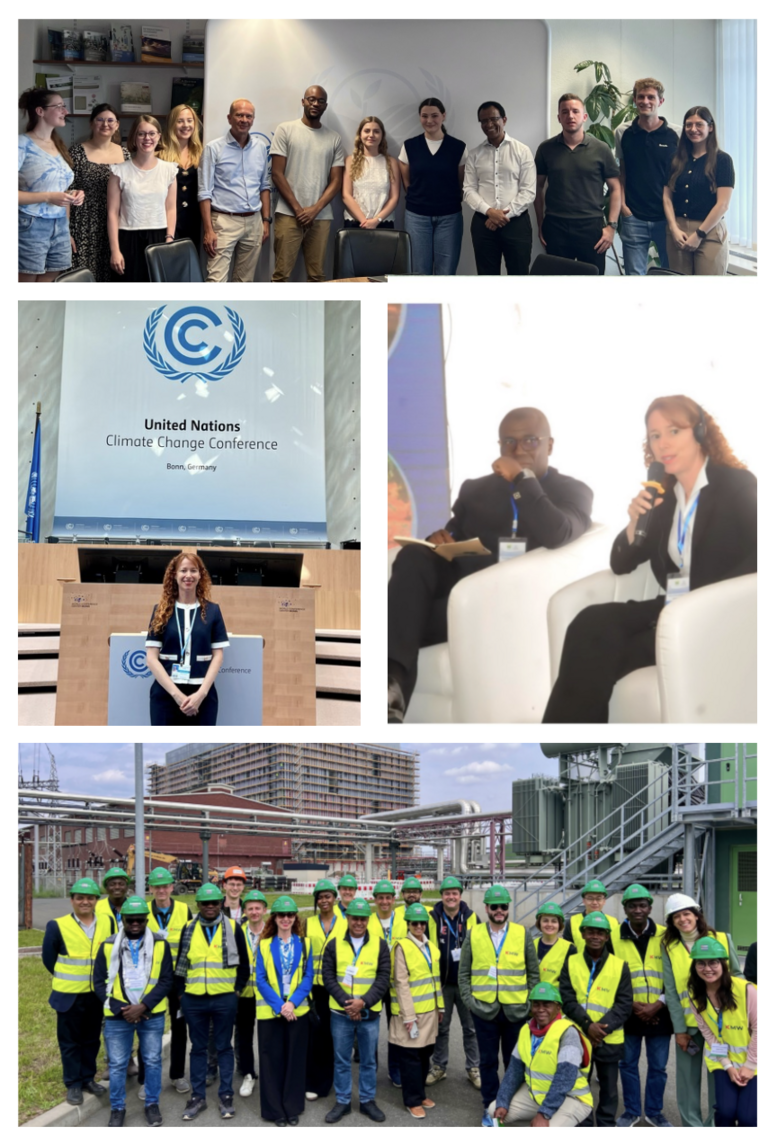
Dr. Maria A. Gwynn, Senior Fellow at the Institute for Public International Law, has been actively involved in several global initiatives for renewable energy and climate resilience over the past month.
At the International Renewable Energy Agency (IRENA) Innovation Week 2025 in Bonn (June 10–13), Dr. Gwynn participated in discussions on renewable energy transitions. The event also included a site visit to a cutting-edge renewable energy project in Mainz.
She was a featured speaker at the regional workshop organised by the Organization for the Development of the Senegal River (OMVS) and the United Nations Framework Convention on Climate Change (UNFCCC), held at Diama Dam (June 17–18). Topics included climate resilience, green finance, and a High-Level Task Force initiative.
At the UNFCCC SB62 pre-COP meeting in Bonn, Dr. Gwynn contributed to the Baku Declaration on Water for Action, now on the COP30 agenda in Brazil.
Additionally, her International Environmental Law class visited the UN Convention to Combat Desertification (UNCCD) Secretariat, engaging in discussions about its implementation efforts.
Oxford-Bonn Doctoral Exchange: Masterclass in International Law
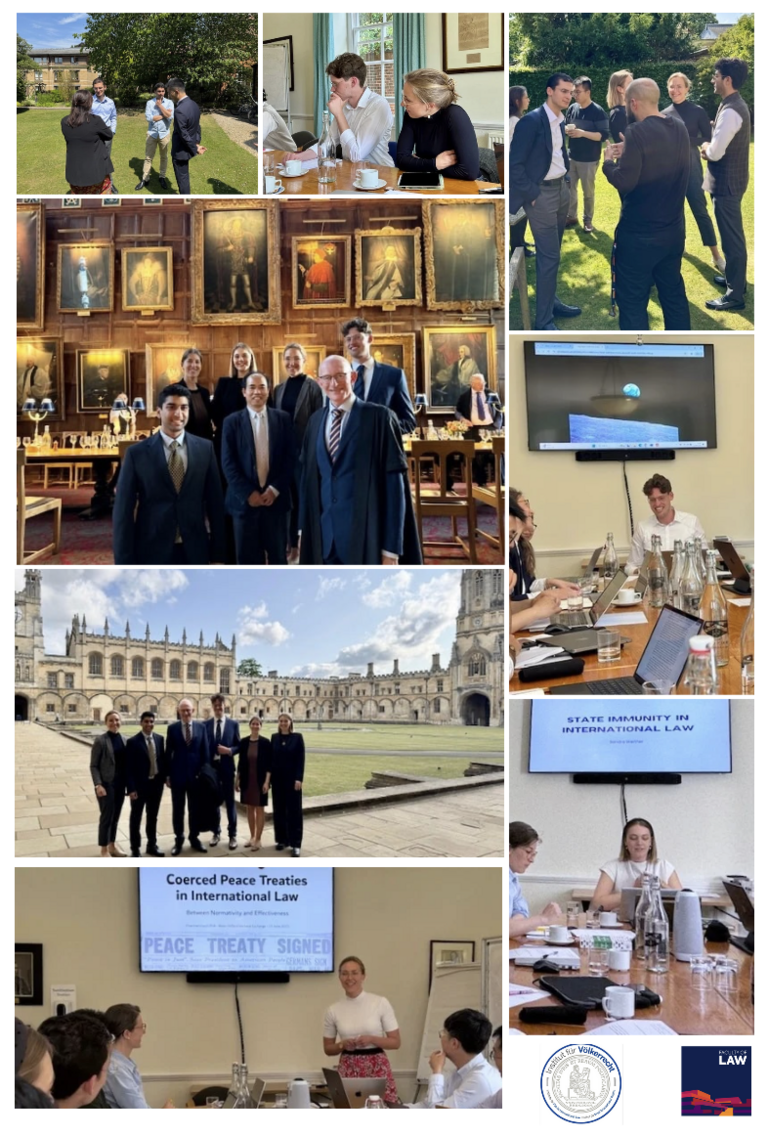
Vom 12. bis zum 13. Juni 2025 fand der erste Oxford-Bonn Doctoral Exchange am St. Anne’s College statt. Fünf Doktorandinnen und Doktoranden des Instituts für Völkerrecht sowie fünf Doktorandinnen und Doktoranden der Faculty of Law der Universität Oxford hatten die Möglichkeit, ihre Forschung im kleinen Rahmen zu diskutieren. Unter der Leitung von Professor Talmon und Professor Tzanakopoulos (Universität Oxford) entstanden lebhafte Diskussionen zu den Themen Seevölkerrecht, Weltraumrecht, Staatenimmunität, dem Konzept von Zwang im Völkerrecht sowie Themen des allgemeinen Völkerrechts.
Neben den thematischen Punkten hatten die Doktoranden auch die Möglichkeit, an einem “formal dinner” im Christ Church College teilzunehmen. Den Abschluss des Seminars bildete die Gastvorlesung von Professor Yee (China Foreign Affairs University).
Die Gemeinschaft, die durch diesen Austausch gebildet wurde, soll auch im digitalen Format weitergeführt werden. Ein Gegenbesuch ist für das nächste Jahr geplant.
The first Oxford-Bonn Doctoral Exchange took place at St Anne's College from 12 to 13 June 2025. Five doctoral students from the Institute of Public International Law and five doctoral students from the Faculty of Law at the University of Oxford had the opportunity to discuss their research in an intimate setting. Under the guidance of Professor Talmon and Professor Tzanakopoulos (University of Oxford), lively discussions were held on the topics of international law of the sea, space law, state immunity, the concept of coercion in international law and topics of general international law.
In addition to the topic-related points, the doctoral students also had the opportunity to take part in a formal dinner at Christ Church College. The seminar concluded with a guest lecture by Professor Yee (China Foreign Affairs University).
The community that was formed through this exchange is to be continued in digital format. A return visit is planned for next year.
Masterclass in International Law, Oxford
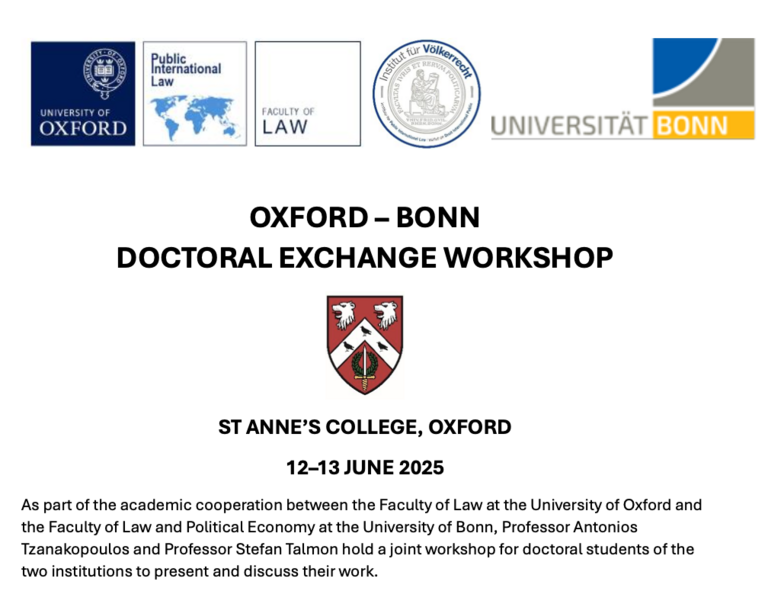
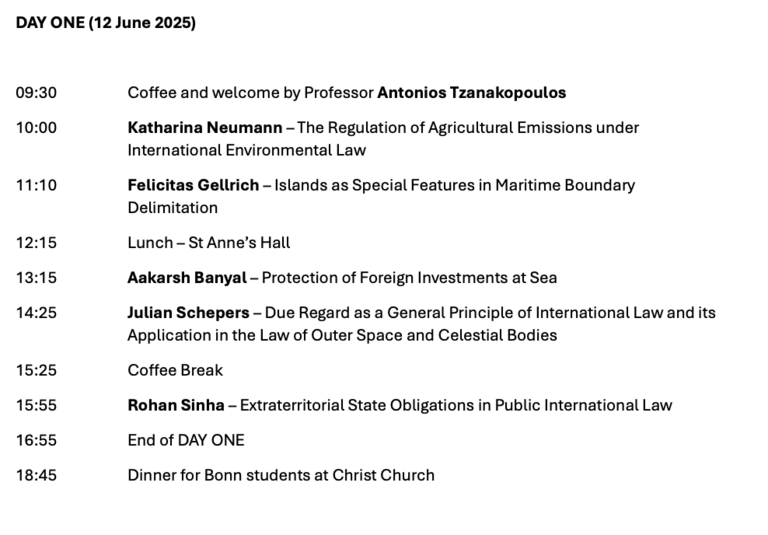
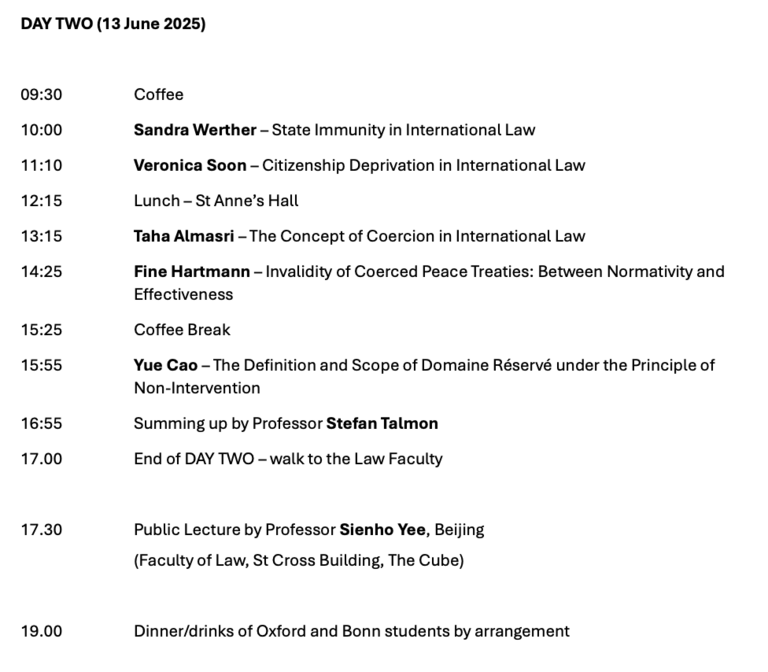
Im Rahmen der Forschungszusammenarbeit zwischen der Universität Bonn und der Universität Oxford werden die Wissenschaftlichen Mitarbeiter des Instituts für Völkerrecht (Lehrstuhl Prof. Dr. Talmon) in der Pfingswoche nach Oxford reisen, um dort zwei Tage lang ihre Doktorarbeiten vorzustellen und diese mit Oxforder Professoren und Doktoranden zu diskutieren. Für das Jahr 2026 ist dann ein Gegenbesuch Oxforder Doktoranden am Institut für Völkerrecht der Universität Bonn geplant.
As part of the academic cooperation between the Faculty of Law at the University of Oxford and the Faculty of Law and Political Economy at the University of Bonn, Professor Antonios Tzanakopoulos and Professor Stefan Talmon hold a joint workshop for doctoral students of the two institutions to present and discuss their work. Professor Talmon's five resarch assistants will travel to Oxford in the upcoming week to use the opportunity to have inspiring conversations on their respective fields of research.
Gastforscher Prof. Desai mit Humboldt-Forschungspreis ausgezeichnet

Bharat Desai, Professor an der Jawaharlal Nehru University (Indien), ist auf Vorschlag von Professor Talmon mit dem Humboldt-Forschungspreis ausgezeichnet worden. Insbesondere erhielt er den Preis für seine grundlegenden Ideen zur Schaffung einer fairen und gerechten globalen Umweltordnung, die die politische und wissenschaftliche Debatte weltweit beeinflusst haben.
Professor Desai verbringt nun ein Jahr am Institut für Völkerrecht als Gastforscher. Während dieses Jahres wird er seine Forschung im Umweltvölkerrecht fortführen und diese in ein Buchprojekt verwandeln. Das Institut für Völkerrecht ist für ihn nicht unbekannt, denn er hat 2015 bereits eine Rhineland Lecture am Institut gehalten. Die Institutsmitglieder freuen sich auf den regen Austausch mit Professor Desai.
Die Uni Bonn hat hierzu auch eine Pressemitteilung veröffentlicht.
Bharat Desai, Professor at Jawaharlal Nehru University (India), has been awarded the Humboldt Research Award on the recommendation of Professor Talmon. In particular, he received the award for his fundamental ideas on the creation of a fair and equitable global environmental order, which have influenced research projects and the political debate worldwide.
Professor Desai is now spending a year at the Institute of International Law as a visiting researcher. During this year, he will continue his research in international environmental law and turn it into a book project. He is no stranger to the Institute of Public International Law, having already given a Rhineland Lecture at the Institute in 2015. The members of the Institute are looking forward to a fruitful exchange with Professor Desai.
The Universtiy of Bonn has also issued a press release on the topic.
Rhineland Lecture in International Law: "What’s the point of jus cogens?"
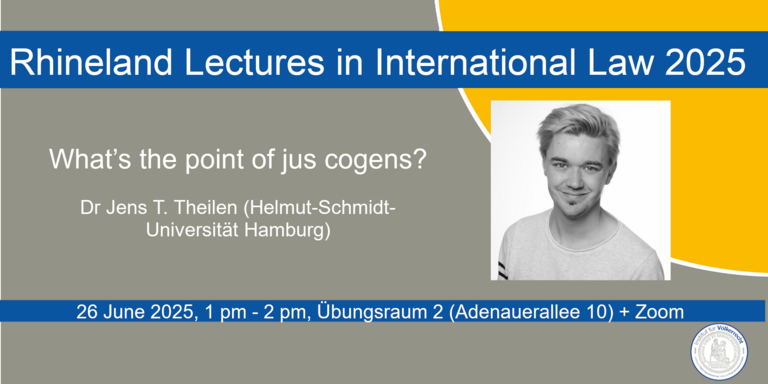
The Institute for Public International Law is pleased to announce that Dr Jens Theilen (Helmut-Schmidt-Universität der Bundeswehr Hamburg) will deliver the next Rhineland Lecture in International Law titled "What’s the point of jus cogens?". The lecture will take place at "Übungsraum 2" at Adenauerallee 10 on 26 June 2025, 13.00-14.00. Participants may join in person or via Zoom. A small coffee break afterwards will allow for an informal exchange over our Institute's delicious tea and coffee.
https://uni-bonn.zoom-x.de/j/65108098270?pwd=8eao3HSesl1nbQuKCWeZ7XhUTuFfyG.1
Meeting-ID: 651 0809 8270
Kenncode: 93847
Proseminar im Wintersemester 2025/26
Ich werde im Wintersemester 2025/26 ein Proseminar veranstalten zum Thema
KI in juristischen Arbeiten anhand der völkerrechtlichen Rechtsprechung des Bundesverfassungsgerichts
Künstliche Intelligenz (KI) hat in den vergangenen Jahren einen grundlegenden Wandel angestoßen, wobei die Anwendung dieser neuen Systeme in der juristischen Ausbildung bislang noch am Anfang steht. Im Proseminar sollen ausgewählte Entscheidungen des Bundesverfassungsgerichts mit völkerrechtlichem Bezug, etwa zu Immunitätsfragen oder Auslandseinsätzen der Bundeswehr, erstmalig mit umfassender KI-Unterstützung vorgestellt und rechtlich eingeordnet werden. Anschließend sollen die Erfahrungen bei der KI-gestützten Erstellung der Arbeit eigenständig dargestellt und bewertet werden. Ziel ist es, die Möglichkeiten und Grenzen des Einsatzes von KI in juristischen Arbeiten aufzuzeigen und zu einer reflektierten Nutzung der KI-Tools zu befähigen.
Mögliche Themen sind unter anderem:
- BVerfGE 6, 309 – Reichskonkordat
- BVerfGE 68, 1 – Atomwaffenstationierung
- BVerfGE 75, 1 – Geltung des Grundsatzes ne bis in idem im allgemeinen Völkerrecht
- BVerfGE 111, 307 – Görgülü
- BVerfGE 112, 1 – Bodenreform III
- BVerfGE 118, 124 – Völkerrechtliche Notstandseinrede
- BVerfG, Beschl. v. 19.09.2006 - 2 BvR 2115/01, 2 BvR 2132/01, 2 BvR 348/03 – Konsularrechtsübereinkommen I
- BVerfGE 128, 326 – Sicherungsverwahrung II
- BVerfGE 141, 1 – Treaty Override
- BVerfGE 16, 27 – Iranische Botschaft
- BVerfGE 46, 342 – Philippinische Botschaft
- BVerfGE 96, 68 – DDR-Botschafter
- BVerfGE 90, 286 – Out of Area Einsätze
- BVerfGE 104, 151 – Kosovo Einsatz
- BVerfGE 121, 135 – Luftraumüberwachung Türkei
- BVerfGE 140, 160 – Evakuierung aus Libyen
Das Proseminar wird am 7./8. November 2025 als Blockveranstaltung in der Bibliothek des Instituts für Völkerrecht (Ostturm, 4. Etage) stattfinden.
Für die Bearbeitung der Proseminararbeit (max. 15 Seiten) sind zwei Monate vorgesehen. Die Bearbeitungszeit liegt in der vorlesungsfreien Zeit. Die Themen werden am 22.07.2025 per E-Mail ausgegeben. Die Arbeiten sind bis spätestens 22.09.2025 einzureichen. Es wird darauf hingewiesen, dass es in diesem Zeitraum aus personellen Gründen eventuell zu eingeschränkten Öffnungszeiten der Bibliothek des Instituts für Völkerrecht kommen kann (d.h. zweitweise Öffnung nur an zwei Vormittagen pro Woche).
Eine Vorbesprechung für das Seminar findet am
Dienstag, dem 01. Juli 2025, um 18:30 Uhr (s.t.)
in der Bibliothek des Instituts für Völkerrecht (Ostturm, 4. Etage) statt.
Im Rahmen der Vorbesprechung erfolgt eine kompakte Einführung in die verschiedenen Nutzungsmöglichkeiten von generativer KI sowie in die Grundlagen des wissenschaftlichen Arbeitens zur Vorbereitung auf das Proseminar.
Die Teilnehmerzahl ist auf 15 Studierende begrenzt. Besondere Vorkenntnisse werden nicht erwartet.
Interessierte Studierende können sich in der Zeit vom 08. bis einschließlich 10. Juli 2025 über das zentrale Portal des Fachbereichs zur Vergabe von Proseminarplätzen (https://seminarvergabe.jura.uni-bonn.de/Startseite.php) für eine Teilnahme am Proseminar anmelden.
Bei Fragen können Sie sich gerne an Frau Felicitas Gellrich (Tel: 0228 73-9681; E-Mail: felicitas.gellrich[at]uni-bonn.de) wenden
Prof. Dr. Stefan Talmon
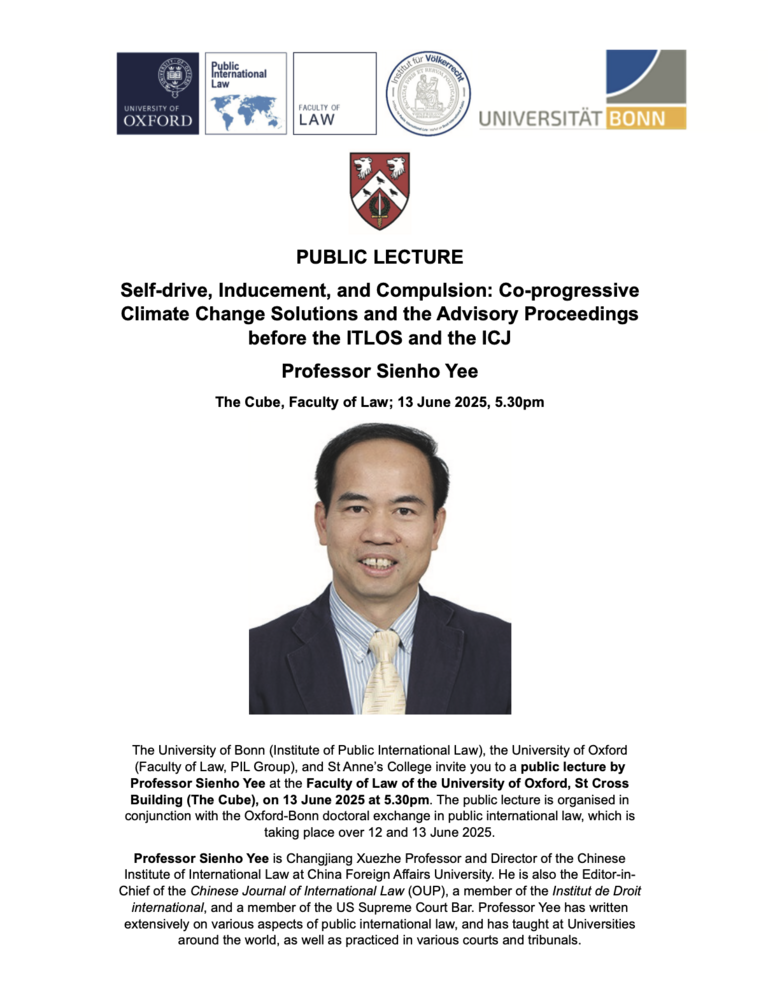
The Bonn-Oxford Doctoral Workshop will be joined by Professor Sienho Yee from the China Foreign Affairs University. We are happy to share that he will give a lecture on "Self-drive, Inducement, and Compulsion: Co-progressive Climate Change Solutions and the Advisory Proceedings before the ITLOS and the ICJ" as part of his support for the academic exchange between the Universities of Bonn and Oxford.
Seminar im Wintersemester 2025/26
Gemeinsam mit Frau Dr. Franziska Knur vom Deutschen Zentrum für Luft- und Raumfahrt (DLR) werde ich im Wintersemester 2025/26 ein Seminar veranstalten für den Schwerpunktbereich XI zum Thema
Raumfahrt im 21. Jahrhundert:
Aktuelle Probleme des Weltraumvölkerrechts
Der Weltraum ist ein internationaler Staatengemeinschaftsraum, dessen Erforschung und Nutzung auf Grundlage des Völkerrechts Sache der gesamten Menschheit ist. Die Ursprünge des Weltraumvölkerrechts reichen zurück in die 1960er Jahre, als bei den Vereinten Nationen zunächst eine Prinzipienerklärung und anschließend der Weltraumvertrag ausgehandelt wurden. Seither hat sich die Raumfahrt grundlegend verändert: Die zunehmende Kommerzialisierung, das Aufkommen privater Raumfahrtunternehmen, ein stark wachsender Weltraumverkehr sowie geopolitische Spannungen stellen erhebliche Herausforderungen für Frieden, Sicherheit und die langfristig nachhaltige Nutzbarkeit des Weltraums dar. Gleichzeitig ist der Nutzen von Satelliten und Weltraumforschung heute größer denn je, und unsere Abhängigkeit von diesen Technologien wächst kontinuierlich.
Das Seminar widmet sich aktuellen Problemen des Weltraumvölkerrechts. Mögliche Themen sind unter anderem:
- Völkerrechtliche Definition und Abgrenzung des Weltraums
- Das Weltraumvölkerrecht als Kind des Kalten Krieges? Entstehung und Fortentwicklung im institutionellen Kontext der Vereinten Nationen
- Die Rolle von Soft Law bei der Weiterentwicklung des Weltraumvölkerrechts
- Haftung für Schäden im Weltraum: Bedeutung und Inhalt von „Verschulden“
- Gesamtschuldnerische Haftung: Sonderfall des Weltraumrechts oder allgemeines Prinzip des Völkerrechts?
- Nachhaltige Raumfahrt: Umweltrechtliche Verpflichtungen im Weltraum?
- Kommerzialisierung der Raumfahrt: Herausforderung für das Weltraumrecht?
- Genehmigung und Aufsicht nicht-staatlicher Raumfahrtaktivitäten: Staatenverantwortung am Beispiel „Beresheet“ und der „Arch Mission Foundation“
- Megakonstellationen als Verstoß gegen das Aneigungsverbot?
- Weltraummüll: Definition, Verantwortlichkeit und Haftung für Schäden
- Rechtsfragen der aktiven Entfernung von Weltraummüll
- Rechtsfragen im Zusammenhang von On-Orbit Servicing, Manufacturing und Recycling
- Kollisionsvermeidung im Orbit auf Grundlage der Due Regard-Pflicht?
- Gestaltung eines internationalen Weltraumverkehrsmanagements: Chancen und Probleme
- Rüstungskontrolle im All: Status quo und Regelungsbedarf, insbesondere in Hinblick auf den Test und Einsatz von Antisatellitenwaffen (ASAT)
- Planetary Defense: Rechtliche Rahmenbedingungen für die Abwehr erdnaher Objekte (Near-Earth Objects)
- Der besondere rechtliche Status des Mondes und anderer Himmelskörper
- Hoheitsgewalt und Kontrolle über Infrastrukturen auf Himmelskörpern
- Sicherheitszonen auf dem Mond: Konzept und damit verbundene Rechtsfragen
- Abbau, Nutzung und Ausbeutung von Ressourcen auf Himmelskörpern: Völkerrechtliche Herausforderungen
- Der rechtliche Status von Weltraumtouristen
- Menschenrechte im Weltraum: Relevanz und Staatenpflichten
Das Seminar wird am 14./15. November 2025 als Blockveranstaltung in der Bibliothek des Instituts für Völkerrecht (Ostturm, 4. Etage) stattfinden.
Die Bearbeitungszeit für die Hausarbeit beträgt sechs Wochen und liegt in der vorlesungsfreien Zeit. Die Ausgabe der Themen kann wahlweise am 04.08. oder 28.08.2025 beim Sekretariat des Instituts erfolgen. Es wird darauf hingewiesen, dass es in diesem Zeitraum aus personellen Gründen eventuell zu eingeschränkten Öffnungszeiten der Bibliothek des Instituts für Völkerrecht kommen kann (d.h. zweitweise Öffnung nur an zwei Vormittagen pro Woche).
Eine Vorbesprechung für das Seminar findet statt am
Montag, den 23. Juni 2025, um 18:30 Uhr
in der Bibliothek des Instituts für Völkerrecht (Ostturm, 4. Etage).
Die Teilnehmerzahl ist auf 15 Studierende begrenzt. Das Seminar steht auch Master- und Begleitfachstudierenden offen. Völkerrechtliche Grundkenntnisse sind hilfreich, aber nicht Voraussetzung.
Interessierte Studierende können sich in der Zeit vom 8. bis einschließlich 10. Juli 2025 über das zentrale Portal des Fachbereichs zur Vergabe von Seminarplätzen (https://seminarvergabe.jura.uni-bonn.de/Startseite.php) für eine Teilnahme am Seminar anmelden.
Bei Fragen können Sie sich gerne an Herrn Julian Schepers (Tel: 0228 73-9681; E-Mail: julian.schepers[at]uni-bonn.de) wenden.
Prof. Dr. Stefan Talmon
Veröffentlichung im Archiv für Völkerrecht
Julian Hettihewa, unser ehemaliger Mitarbeiter, Doktorand und nun Research Associate, veröffentlichte jüngst einen Artikel im Archiv für Völkerrecht mit dem Titel "Potenziale der Youth Studies im Völkerrecht: Ein Plädoyer für einen wissenschaftlichen Austausch" (AVR 62, 2024, S.466-486).
Der Artikel ist hier verfügbar.
Rhineland Lecture in International Law: "The international legal order in a more multipolar world: What role for regional international law?”"
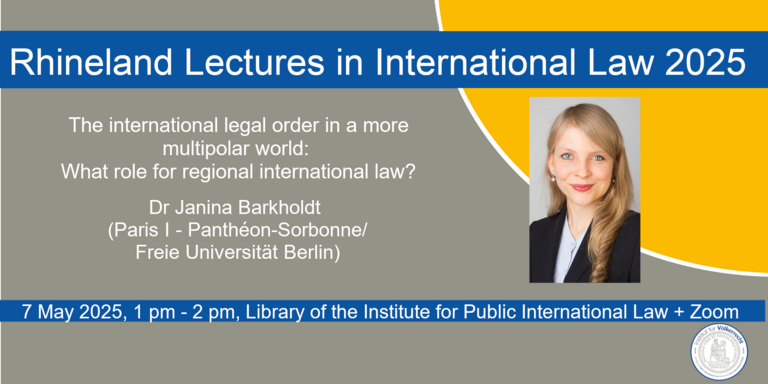
The Institute for Public International Law is pleased to announce that Dr Janina Barkholdt (Paris I - Panthéon-Sorbonne/Freie Universität Berlin) will deliver the next Rhineland Lecture in International Law titled "The international legal order in a more multipolar world: What role for regional international law?". The lecture will take place at the Institute's library on 7 May 2025, 13.00-14.00. Participants may join in person or via Zoom. A small coffee break afterwards will allow for an informal exchange over our Institute's delicious tea and coffee!
https://uni-bonn.zoom-x.de/j/64884939204?pwd=PODzW6hcPwcIWlJ1Stx5Z7EBv9TPiR.1
Meeting-ID: 648 8493 9204
Kenncode: 749346
Event on Transboundary Waters in Bonn
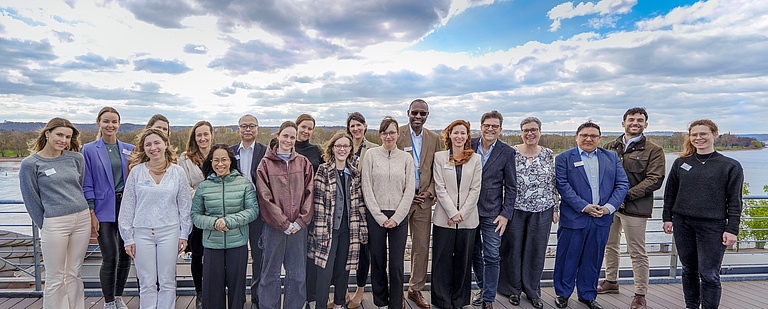
Dr Maria Gwynn, Senior Fellow of the International Law Institute, organized an event bringing together representatives from Germany’s Ministry of Environment, the International Commission of the river Rhine, the UNFCCC, GIZ, IUCN, and other key stakeholders, to discuss the most important aspects and challenges concerning international law and sustainable management of transboundary waters.
Dr Maria A. Gwynn speaks at 13th Annual Latin American Policy Forum
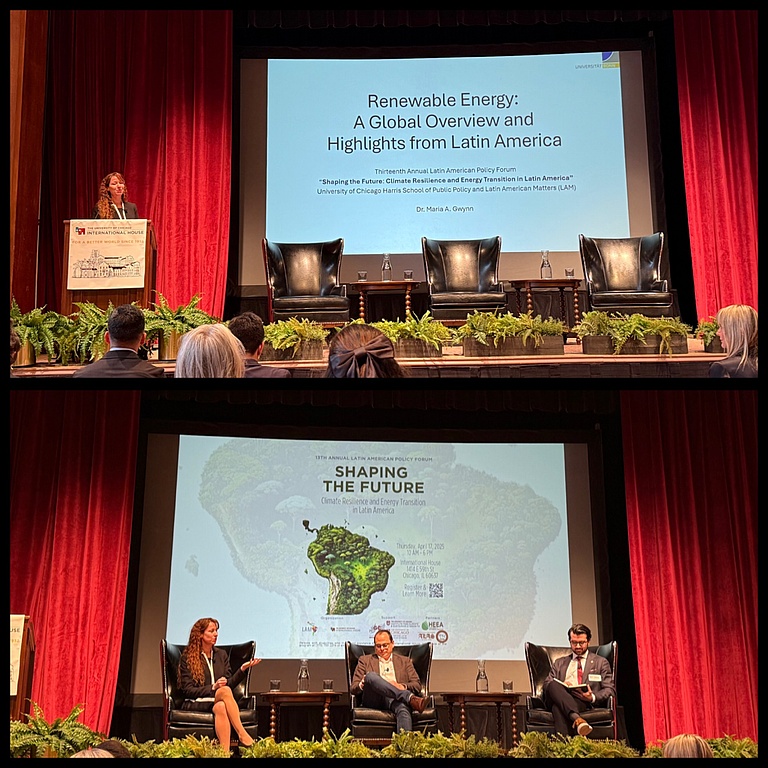
As invited speaker of the University of Chicago Harris School of Public Policy, Dr Maria A. Gwynn, Senior Fellow of the International Law Institute, presented at the Thirteenth Annual Latin American Policy Forum, “Shaping the Future: Climate Resilience and Energy Transition in Latin America” on the topic of Renewable Energy: Global Overview and current highlights from Latin America.
Rhineland Lecture in International Law: "Addressing apparent asymmetry in international investment law"
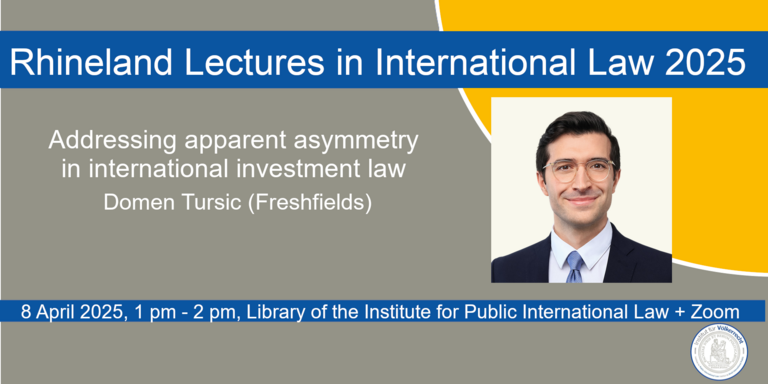
The Institute for Public International Law is pleased to announce that Domen Tursic (Freshfields) will deliver the next Rhineland Lecture in International Law titled "Addressing apparent asymmetry in international investment law". The lecture will take place at the Institute's library on 8 April 2025, 13.00-14.00. Participants may join in person or via Zoom. A small coffee break afterwards will allow for an informal exchange over our Institute's delicious tea and coffee!
https://uni-bonn.zoom-x.de/j/67149712382?pwd=tyzlGkolllrfjUjbQumu8X4xNSO8Gf.1
Meeting-ID: 671 4971 2382
Kenncode: 498216
Dr. Hettihewa
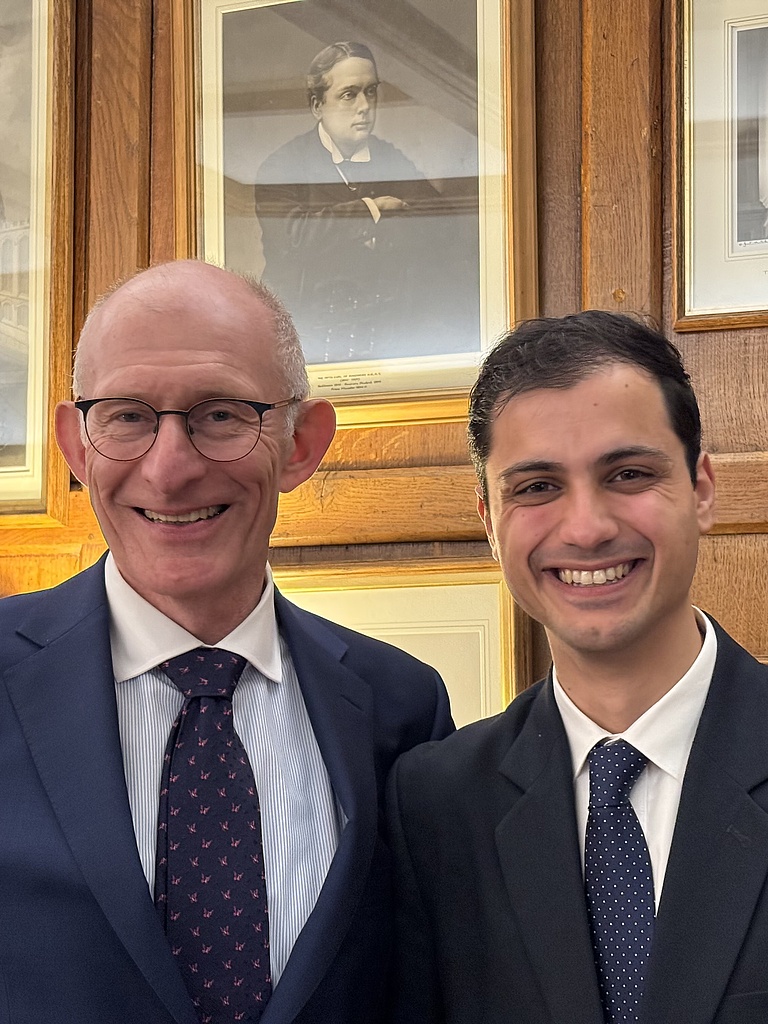
Das Institut für Völkerrecht gratuliert Julian Hettihewa zum erfolgreichen Abschluss der Promotion!
Publication in the Heidelberg Journal of International Law
Our PhD candidate Julian Hettihewa published his article titled "Constructing Youth as Progress: Tracing Shared Efforts of the League of Nations and the United Nations" with the Heidelberg Journal of International Law (Vol 84 No 4, 2024, pp 843-863).
The article can be accessed here.
Rhineland Lecture in International Law: "The Death and Life of the Prohibition on Forcible Reprisals"
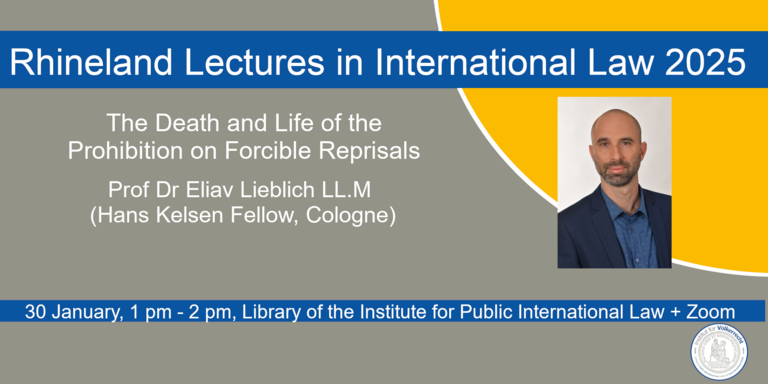
The Institute for Public International Law is pleased to announce that Prof Dr Eliav Lieblich LL.M. (Hans Kelsen Fellow, Cologne) will deliver the first Rhineland Lecture in International Law in 2025 titled "The Death and Life of the Prohibition on Forcible Reprisals". The lecture will take place at the Institute's library on 30 January 2025, 13.00-14.00. Participants may join in person or via Zoom. A small coffee break afterwards will allow for an informal exchange over our Institute's delicious tea and coffee!
uni-bonn.zoom-x.de/j/65259033983
Meeting-ID: 652 5903 3983
Kenncode: 631535
Visit to UN
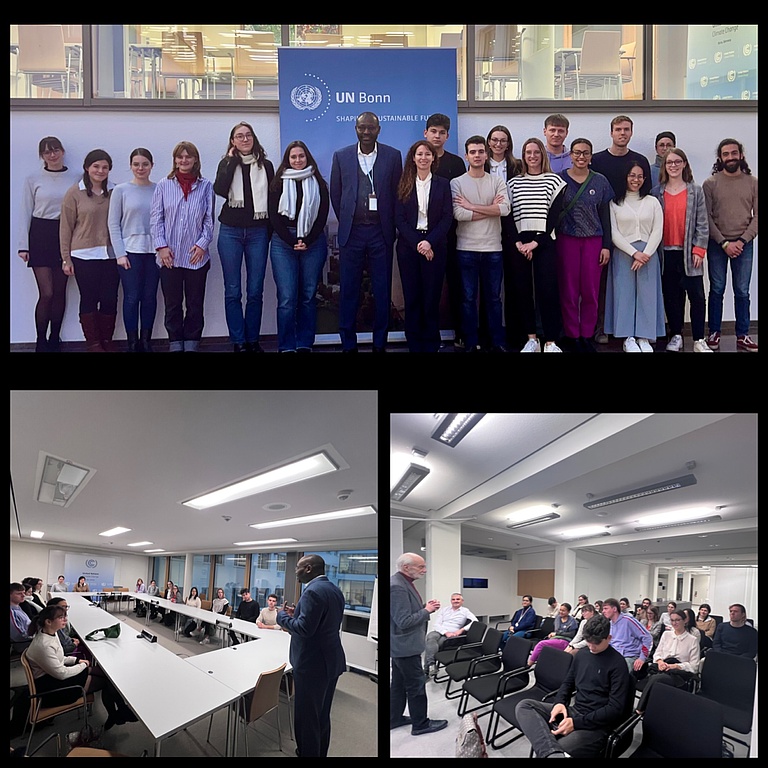
Students of the University of Bonn visited the United Nations in Bonn. Further to learning about the UN system and the UN agencies in Bonn, they were also welcomed by the UNFCCC Executive Director of the Global Innovation Hub with whom they discussed about key factors for successful initiatives, leadership and innovations which are necessary to face the challenges of climate change. The visit took place as part of the optional seminar “International Institutions of Water and Energy” offered by Dr. Maria A. Gwynn, Senior Fellow of the International Law Institute.
Dr. Maria A. Gwynn speaks to government officials from DRC and Zambia on International Watercourses Agreements

Government officials of the Democratic Republic of Congo and Zambia met today with the aim to negotiate a cooperative Agreement for Luapula River & Lake Mweru Authority. On the occasion, Dr. Maria A. Gwynn, senior fellow of the International Law Institute of the University of Bonn spoke on the topic “Negotiating substantive and procedural norms in International Watercourses Agreements: drawing lessons from the practice of Latin America” highlighting the importance of legal frameworks and joint institutions in strengthening transboundary water cooperation.
Rhineland Lecture in International Law: "On the origins of modern international investment law: the 1967 OECD Draft Convention on Protection of Foreign Property"
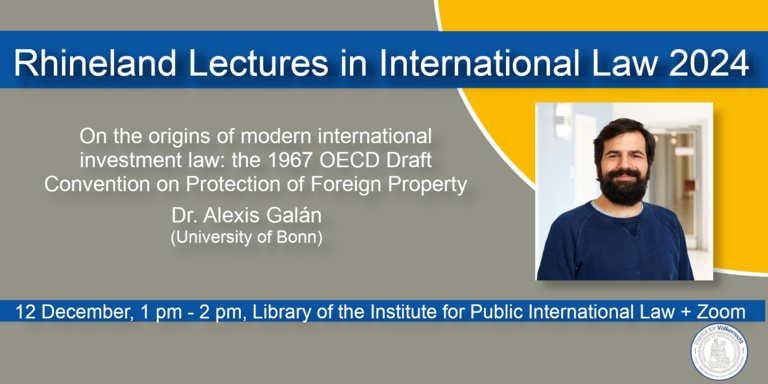
The Institute for Public International Law is pleased to announce that Dr Alexis Galán (University of Bonn) will deliver the next Rhineland Lecture in International Law titled "On the origins of modern international investment law: the 1967 OECD Draft Convention on Protection of Foreign Property ". The lecture will take place at the Institute's library on 12 December 2024, 13.00-14.00. Participants may join in person or via Zoom. A small coffee break afterwards will allow for an informal exchange over our Institute's delicious tea and coffee!
https://uni-bonn.zoom-x.de/j/65820145328?pwd=qdPb7P1FRxDsa9FdOFeO7tvEnToe2Y.1
Meeting-ID: 658 2014 5328
Kenncode: 295681
Rhineland Lecture: "Archipelagos, imperial boundary-making, and the question of ‘whose history?’ in post-colonial Philippines"
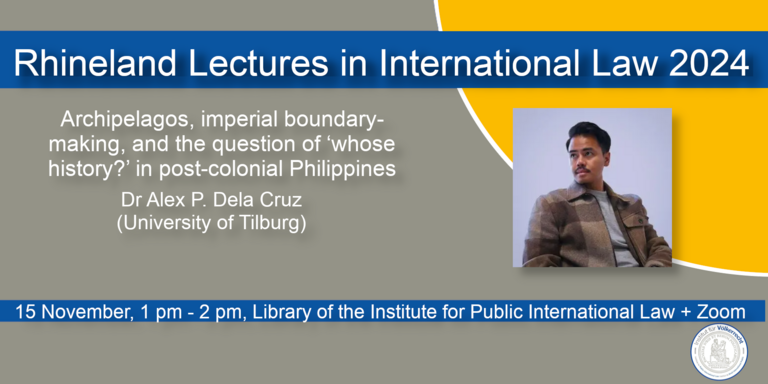
The Institute for Public International Law is pleased to announce that Dr Alex P. Dela Cruz (Tilburg University) will deliver the next Rhineland Lecture in International Law titled "Archipelagos, imperial boundary-making, and the question of ‘whose history?’ in post-colonial Philippines". The lecture will take place at the Institute's library on 15 November 2024, 13.00-14.00. Participants may join in person or via Zoom. A small coffee break afterwards will allow for an informal exchange over our Institute's delicious tea and coffee!
https://uni-bonn.zoom-x.de/j/69678101380?pwd=5M6dwymYWYp96fvpGTewgQY4JTfih5.1
Meeting-ID: 696 7810 1380
Passcode: 585398
Visit to IRENA
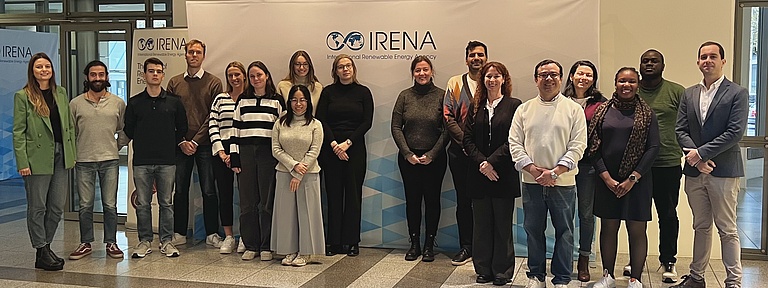
Law students and members of the Institute for Public International Law visited the Innovation and Technology Centre of the International Renewable Energy Agency (IRENA) to learn more about this intergovernmental institution and to discuss international frameworks, policies and regulations concerning renewable energy transition and energy efficiency. The visit was part of the lectures on "Institutions of International Water and Energy Law" delivered by Dr. Maria Gwynn in the Winter Semester 2024-25.
Dr. Maria A. Gwynn appointed to Implementation Committee of UN Water Convention
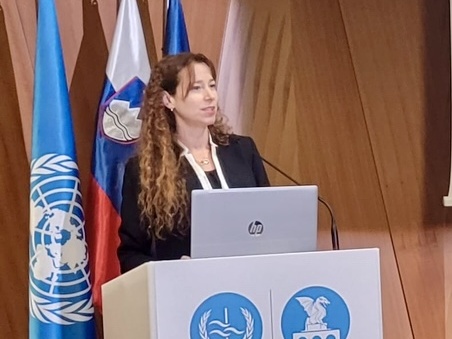
Dr Maria A. Gwynn was appointed as one of nine members of the Implementation Committee of the UN Water Convention upon the nomination of Germany. The Committee facilitates, promotes and safeguards the implementation and application of and compliance with the Convention.
Institut für Völkerrecht sucht Studentische Hilfskräfte (SHK)
Das Institut für Völkerrecht sucht zum nächstmöglichen Zeitpunkt zwei Studentische Hilfskräfte.
Nähere Informationen entnehmen Sie bitte den folgenden Stellenausschreibungen:
- Studentische Hilfskraft zur Verstärkung des Instituts
- Studentische Hilfskraft zur Unterstützung des Projekts "German Practice in International Law"
Wir freuen uns auf Ihre Bewerbungen bis zum 31.10.2024.
POSTPONED: Rhineland Lecture: "Exploding Pagers and Walkie-Talkies: What does international law have to say about it?"
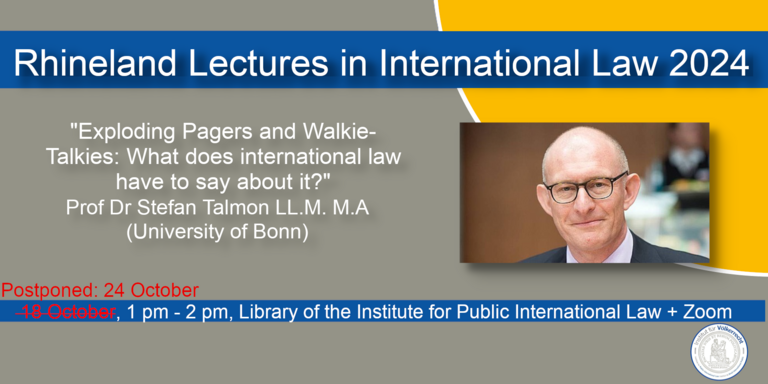
Update: Please note that the Rhineland Lecture has been postponed to Thursday, October 24th, 1 pm.
––––––––
Professor Dr Stefan Talmon LL.M. M.A. will deliver another Rhineland Lecture in International Law titled "Exploding Pagers and Walkie-Talkies: What does international law have to say about it?". The lecture will take place at the Institute's library on 24 October 2024, 13.00-14.00. Participants may join in person or via Zoom. A small coffee break afterwards will allow for an informal exchange over our Institute's delicious tea and coffee!
https://uni-bonn.zoom-x.de/j/65100332490?pwd=8av8iWXqpF6H61irYPSx0NIIdNPk8P.1
Meeting-ID: 651 0033 2490
Passcode: 182599
Einsichtnahme Modalitäten SoSe 2024
Prüfungsnummer 2141: Völkerrecht III/ Recht der internationalen Sicherheit und der bewaffneten Konflikte (Prof. Talmon)
Prüfungsnummer 2053: Die EU als Akteur des Völkerrechts/ Europäisches Recht der Außen- und Sicherheitspolitik
Termine zur Einsichtnahme/Abholung: 08.10.2024 bis 10.10.2024, jeweils von 09:00 bis 12:00 Uhr.
Ort der Einsichtnahme/Abholung: Universität Bonn, Adenauer Allee 24-42, 53113 Bonn (Ostturm, 3. OG), Raum 3.028, Sekretariat.
Modalität der Remonstration: Per E-Mail: sekretariatvr@uni-bonn.de
Persönlich: Abgabe im Sekretariat, Raum 3.028, während der Öffnungszeiten.
Dr Maria A. Gwynn speaker at high-level on-line events on international water law
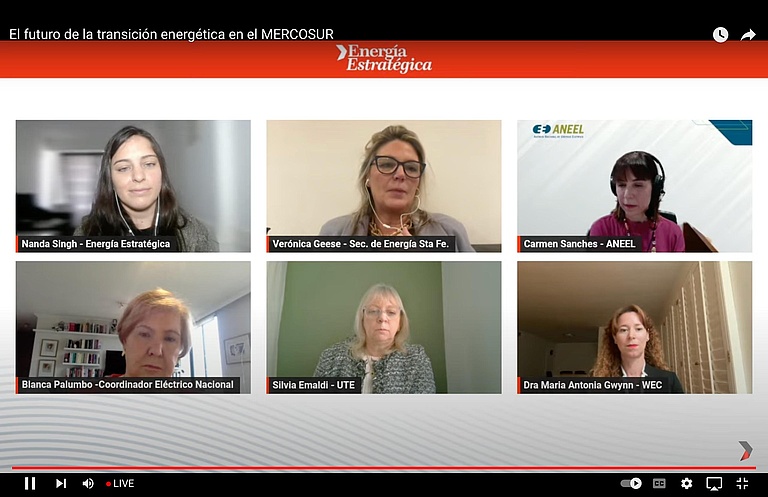
On 25 August 2024, Dr Gwynn was a keynote speaker at a session of the “World Water Week” that was jointly organized by UNECE, the Organization of American States, and the Inter-American Development Bank, and that focused on collaborative actions for sustainable shared water management in Latin America and the Caribbean. Dr Gwynn shared successful examples, discussed challenges, and emphasized the need for building strong institutions, legal frameworks, and knowledge sharing towards better Hydro-Diplomacy. The next day, she was also a panellist in the session organized by the Finnish Water Institute, the IUCN, and the Stockholm International Water Institute, on the art Water Diplomacy, where she discussed key takeaways for achieving successful outcomes in disputes over transboundary water resources.
On 29 August 2024, she spoke at “The future of energy transition in the MERCOSUR”, an event where outstanding Women in the Energy Sector of Mercosur discussed different aspects for achieving a renewable energy transition from the private and public sectors’ perspectives. She shared about positives steps from countries in the region towards the transition, and among many issues, she remarked Paraguay as one of the few countries in the world to have an Interconnected electrical system deriving from 100% renewable sources.
New publication on Secession and Self-Determination of Peoples
An article written by our Institute's Rohan Sinha on the famous Quebec decision of the Canadian Supreme Court has recently been published in the Max Planck Encyclopedia of Comparative Constitutional Law. It analyses the constitutional and public international law aspects of unilateral secession and the right to self-determination of peoples and compares it with similar court decisions on the independence of Bavaria, Scotland, Catalonia, Kurdistan, Kosovo, Texas and Veneto, among others.
Online access: oxcon.ouplaw.com/display/10.1093/law-mpeccol/law-mpeccol-e563
Ein Artikel unseres wissenschaftlichen Mitarbeiters Rohan Sinha über die bedeutende Quebec-Entscheidung des Obersten Gerichtshofs von Kanada wurde soeben in der Max Planck Encyclopedia of Comparative Constitutional Law veröffentlicht. Er behandelt völker- und verfassungsrechtliche Fragen der Sezession von Staatsgebiet und des Selbstbestimmungsrechts der Völker und vergleicht das kanadische Urteil mit ähnlichen Gerichtsentscheidungen - u.a. zur Unabhängigkeit Bayerns, Schottlands, Kataloniens, Kurdistans, des Kosovo und Texas.
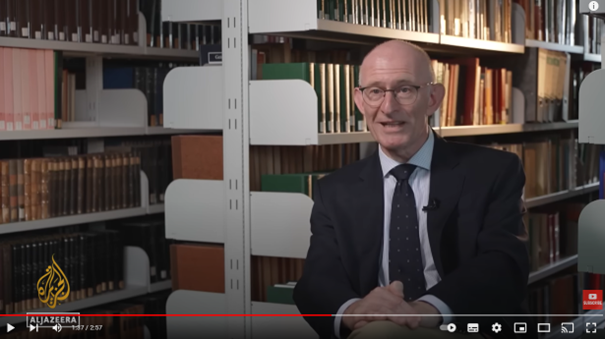
On Friday, Al Jazeera English broadcast a video including an interview with Professor Talmon on the ICC's arrest warrants against Israeli Prime Minister Benjamin Netanyahu. The video is accessible here.
Rhineland Lecture: International Law in International Sports Organisations
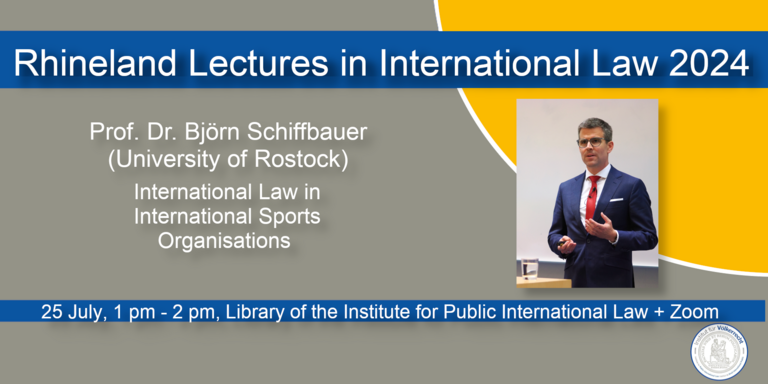
The Institute for Public International Law is pleased to announce that Professor Dr Björn Schiffbauer (University of Rostock) will deliver the next Rhineland Lecture in International Law titled "International Law in International Sports Organisations". The lecture will take place at the Institute's library on 25 July 2024, 13.00-14.00. Participants may join in person or via Zoom. A small coffee break afterwards will allow for an informal exchange over our Institute's delicious tea and coffee!
uni-bonn.zoom-x.de/j/62859105569
Meeting-ID: 628 5910 5569
Passcode: 923938
Rhineland Lecture: Indigenous Laws and Human Rights
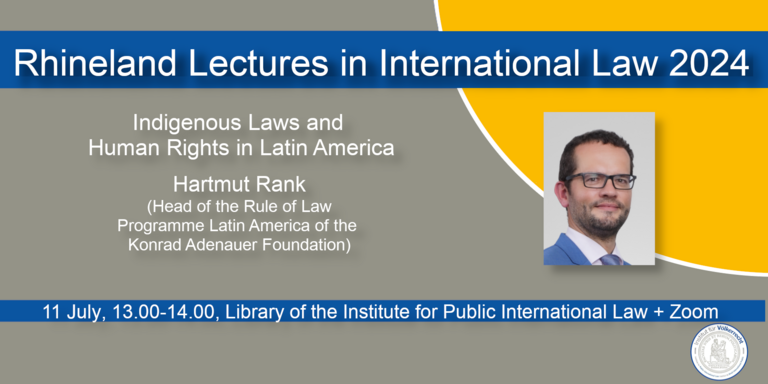
The legal structures of Latin American States reflect their cultural diversity. Yet, the attempt to recognise indigenous legal orders is a comparatively new phenomenon. The Rule of Law Programme of the Konrad Adenauer Foundation aims to promote the dialogue between indigenous leaders and state authorities in the region. Sometimes, the community-focused approach of indigenous laws comes into conflict with traditional international human rights law and its focus on the individual. In his lecture, Hartmut Rank, head of the Rule of Law Programme Latin America of the Konrad Adenauer Foundation, will explore this tension. We are looking forward to fruitful discussions.
This lecture is part of the Rhineland Lectures in International Law series, which seeks to combine theory and practice in international law, and to show different approaches to issues in international law.
Participation is also possible online:
https://uni-bonn.zoom-x.de/j/65684335001?pwd=bumTrx9dRAO6uOilLON6bIJfzsybUa.1
Meeting-ID: 656 8433 5001
Kenncode: 751631
Jus Cogens United participated in the Faculty's Soccer Cup!
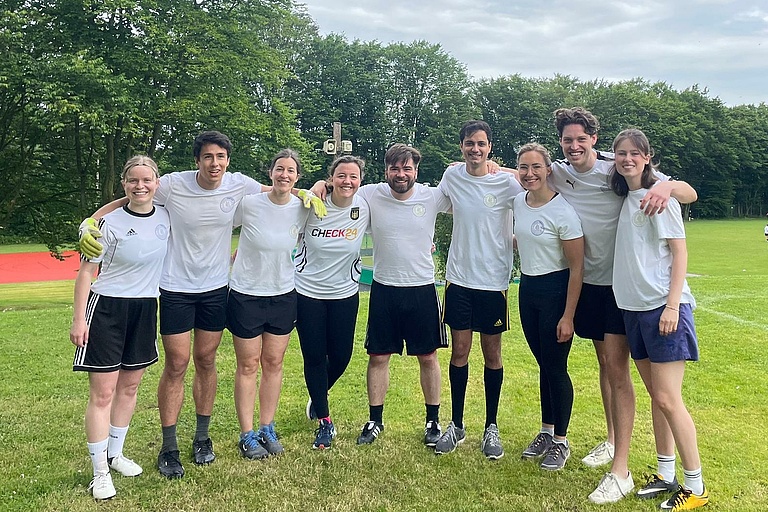
The institute is proud to announce that the Prof. Talmon's team "Jus Cogens United" successfully participated in the Faculty of Law's annual soccer cup!
Lehre im Wintersemester 2023/24
Für den Schwerpunktbereich XI werden im Wintersemester 2023/24 folgende Veranstaltungen angeboten:
| Kernbereich | Prof. Dr. Talmon |
| Kernbereich | Prof. Dr. Talmon |
| Wahlbereich | Prof. Dr. Talmon |
| Wahlbereich | Prof. Dr. De Wet |
| Wahlbereich | Prof. Dr. Stuckenberg |
| Seminar | Prof. Dr. Talmon |
Rhineland Lecture: Dr. Moritz Bake zu maritimer Sicherheit, 1. Juli, 15.00 Uhr
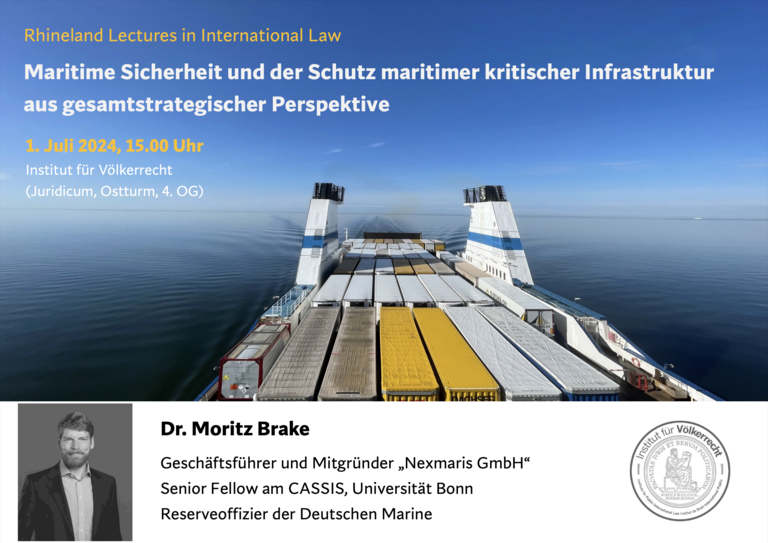
Wir freuen uns, Dr. Moritz Brake für unsere nächste Rhineland Lecture zum Thema "Maritime Sicherheit und der Schutz maritimer kritischer Infrastruktur aus gesamtstrategischer Perspektive" gewonnen zu haben! Die Veranstaltung findet in unserer Bibliothek (Juridicum, 4. OG Ostturm) und über Zoom statt:
https://uni-bonn.zoom-x.de/j/65322939540?pwd=l63brTe50BmlItGCvatEbXOa2F85dR.1
Meeting-ID: 653 2293 9540
Kenncode: 819755
Wir freuen uns auf zahlreiche Teilnehmende!
Dr. Maria A. Gwynn Part of Germany´s Delegation to High Level Conference in Dushanbe
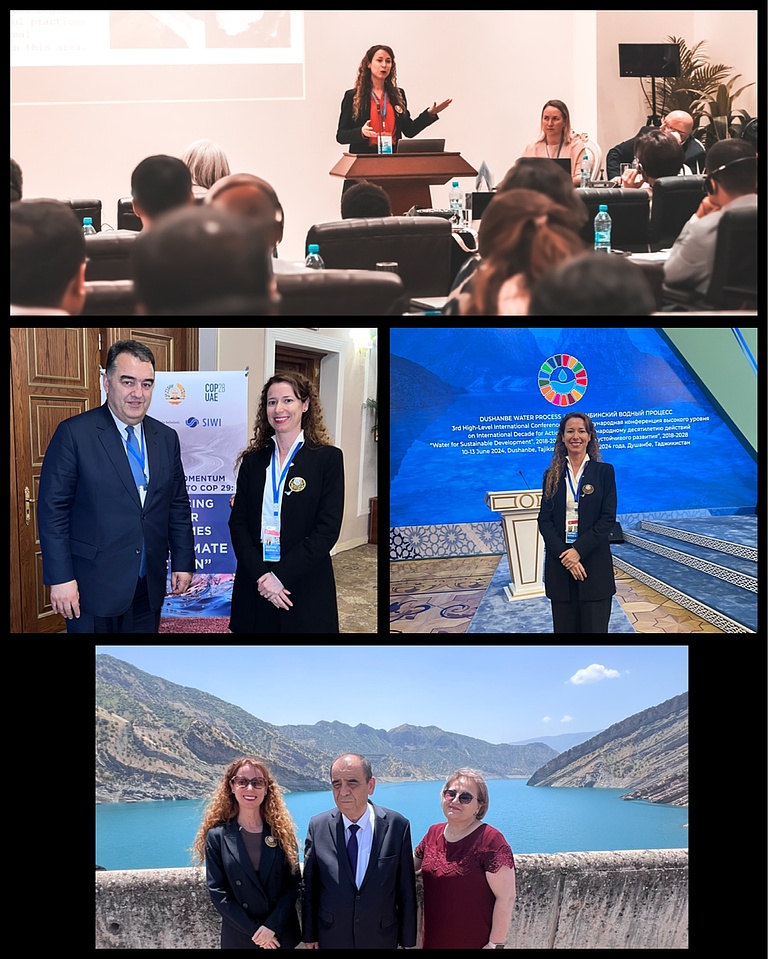
Dr. Maria A. Gwynn, Senior Fellow of the International Law Institute, was part of the Federal Republic of Germany's Delegation to the 3rd High Level International Conference on the Decade for Action “Water for Sustainable Development” in Tajikistan. She gave a talk at the Basin Organisations Forum on the international legal framework for transboundary water cooperation. During the conference, she had a chance to visit the largest hydropower plant in Central Asia.
Seminar im Wintersemester 2024/25
Ich werde im Wintersemester 2024/25 ein Seminar veranstalten für den Schwerpunktbereich XI (neue Prüfungsordnung) und die Schwerpunktbereiche 6 und 8 (alte Prüfungsordnung) zum Thema
Der Gaza-Krieg und Nahostkonflikt im Lichte des Völkerrechts
Seit dem Angriff der Hamas und anderer Terrororganisationen auf Israel am 7. Oktober 2023 und der israelischen Militäraktion im Gazastreifen ist der Nahostkonflikt wieder in das Blickfeld einer weiteren Öffentlichkeit getreten. Das Seminar widmet sich den völkerrechtlichen Fragen, die der Nahostkonflikt in den letzten 80 Jahren und der zweite Gaza-Krieg aufgeworfen haben.
Mögliche Themen sind unter anderem:
- Der Erste Weltkrieg, der Völkerbund und das britische Mandat für Palästina
- Die Vorschläge der Vereinten Nationen zur Beilegung des Nahostkonflikts von der Teilungsresolution 181 (II) der UN-Generalversammlungsresolution bis zur Zwei-Staaten-Lösung
- Die Gründung des Staates Israels und die (Nicht-)Anerkennung und der Boykott Israels durch arabische und islamische Staaten
- Der erste arabisch-israelische Krieg 1948-1949 (einschließlich Rechtsstellung der Konfliktparteien, anwendbares Kriegsrecht, Waffenstillstand, territoriale Lage nach Ende des Krieges)
- Die Rechtsstellung der palästinensischen Flüchtlinge und die United Nations Relief and Works Agency for Palestine Refugees in the Near East (UNRWA)
- Das Selbstbestimmungsrecht des palästinensischen Volkes
- Die Palästinensische Befreiungsbewegung (PLO) (Rechtsstellung, Terrororganisation oder Vertreterin der palästinensischen Volkes, Vertretung in den Vereinten Nationen)
- Der Sechstagekrieg 1967 (einschließlich Angriff/präventive Selbstverteidigung, Waffenstillsand, territoriale Lage nach Ende der Kampfhandlungen)
- Die Rechtsstellung Jerusalems von 1948 bis heute (einschließlich der Annexion von Ostjerusalem durch Israel, die Rechtsstellung der in Ostjerusalem lebenden Palästinenser)
- Die israelische Besetzung des Westjordanlandes, Ostjerusalems und des Gazastreifens (einschließlich der israelischen Siedlungspolitik, Intifada I und II, der Frage der Besetzung des Gazastreifens nach dem israelischen Rückzug 2005, der Vorwurf der Apartheid)
- Die Camp David-Abkommen 1978
- Israels Invasionen und Besetzungen im Libanon, 1978-2000 (einschließlich des Massakers von Sabra and Shatila)
- Die israelische Annexion des syrischen Golan
- Der Oslo-Friedensprozess mit den dazugehörigen Abkommen
- Der Bau einer Schutzmauer durch Israel in den palästinensischen besetzten Gebieten des Westjordanlandes und das Rechtsgutachten des Internationalen Gerichtshofs
- Der erste Gaza-Krieg (2008-2009)
- Die israelische Blockade des Gazastreifens und der der internationales Gaza-Friedens-Konvoi (2010)
- Der zweite Gaza-Krieg (2023-2024) (einschließlich der Rechtsstellung der Hamas-Kämpfer, Israels Recht auf Selbstverteidigung, Kriegsverbrechen)
- Der Vorwurf des Völkermords gegen Israel und das Verfahren vor dem Internationalen Gerichtshof (einschließlich der Intervention durch andere Vertragsparteien der Völkermordkonvention)
Das Seminar wird am 11./12. Oktober 2024 als Blockveranstaltung in der Bibliothek des Instituts für Völkerrecht (Ostturm, 4. Etage) stattfinden.
Die Bearbeitungszeit für die Hausarbeit beträgt sechs Wochen und liegt in der vorlesungsfreien Zeit. Die Ausgabe der Themen erfolgt ab dem 22.07.2024 beim Sekretariat des Instituts.
Es wird keine Vorbesprechung für das Seminar stattfinden. Bei Fragen kann sich an gerne an Herrn Julian Schepers (Tel: 0228 73-9681; E-Mail: julian.schepers@~@uni-bonn.de) gewandt werden.
Die Teilnehmerzahl ist auf 10 Studierende begrenzt. Das Seminar steht auch Master- und Begleitfachstudierenden offen. Völkerrechtliche Grundkenntnisse sind hilfreich, aber nicht Voraussetzung.
Interessierte Studierende können sich in der Zeit vom 9. bis einschließlich 11. Juli 2024 über das zentrale Portal des Fachbereichs zur Vergabe von Seminarplätzen (https://seminarvergabe.jura.uni-bonn.de/Startseite.php) für eine Teilnahme am Seminar anmelden.
Prof. Dr. Stefan Talmon
World Water Forum 2024
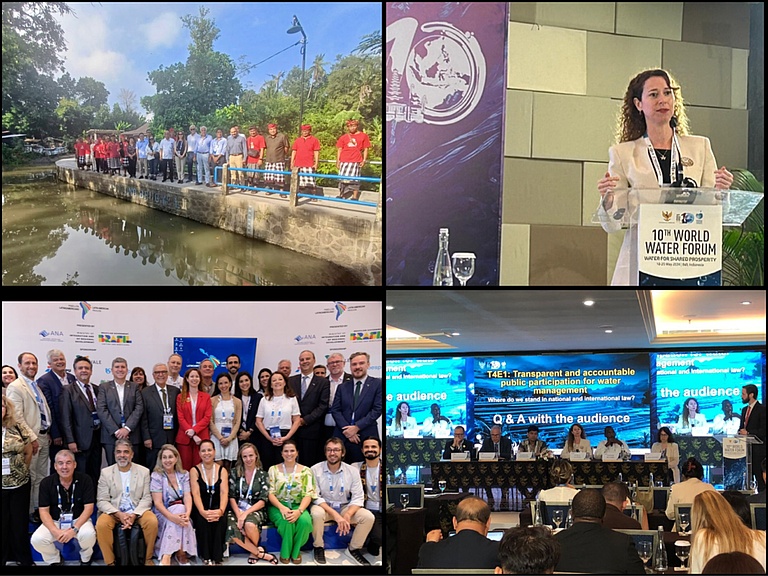
International organizations, government representatives, private and public institutions, academics, and experts gathered on occasion of the World Water Forum, which took place on May 18-25 in Bali, Indonesia.
Dr. Maria A. Gwynn was an invited speaker to a number of panels organised by the United Nations Economic Commission for Europe, UNESCO, and by the Asian Development Bank. She covered several topics from an international law perspective, such as access to information, stakeholder participation in decision making, and access to justice for water management. She also spoke at the regional session on South America that dealt with water security and water for humans, and in sessions regarding different forms of investments and financing applied to water projects that could deliver improved outcomes for humanity, society, and nature. During the Forum, Dr. Gwynn also participated in special events such as the inauguration of the UNESCO Eco-Hydrology demonstration site for the Subak and the launch of the Latin American Water Council.
Bonner Reading Group: Special Edition
28 May, 5 pm, in our library (4th floor Juridicum Ostturm)This month, we celebrate the 75th anniversary of the Basic Law.
That is the occasion to discuss the relationship between constitutional arrangements and international law more broadly.
We especially welcome students with experience in other countries, who want to talk about the reception of international law in their host country.
All welcome!
Tuesday, 28th May, 5 pm in our library (Juridicum Ostturm, 4th floor)
Join our Big Screen Event!

In 2022, the “Commission of Small Island States on Climate Change” asked the International Tribunal of the Law of the Sea (ITLOS) for an Advisory Opinion on issues of climate change mitigation and the protection of the environment. The proceedings illustrate the so-called climate change litigation, which means that international obligations to prevent climate change are enforced in international courts and tribunals. ITLOS will announce its opinion on 21st May.
Tuesday, 21st May:
- 11.20 am: Introduction to the case and the concept of climate change litigation
- 12.00 am: Watching the live stream of the Advisory Opinion
All welcome!
Dr Maria A. Gwynn speaks as panelist at World Energy Congress
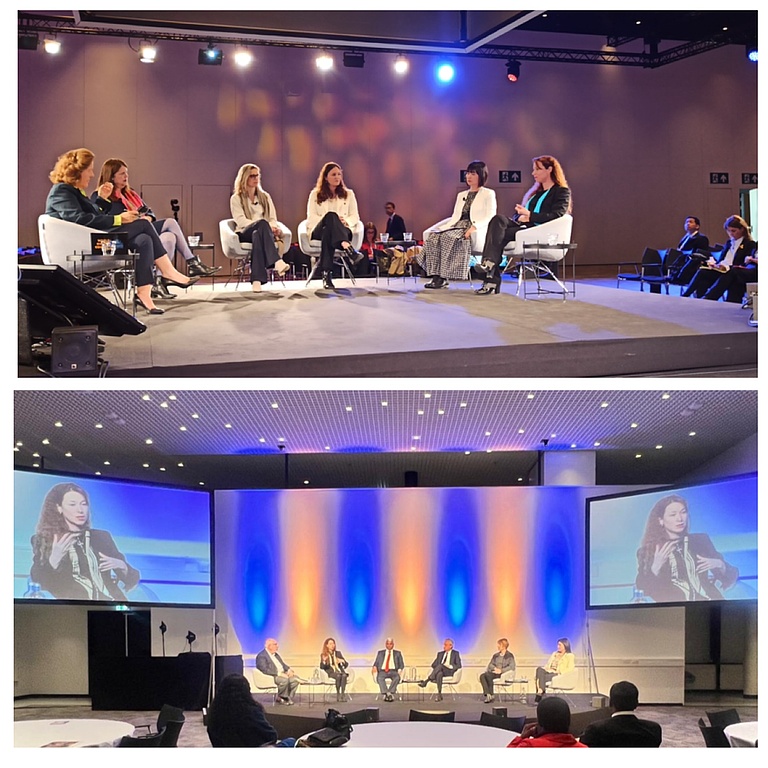
Energy experts, governmental officials, and other stakeholders participated in the World Energy Congress that took place in Rotterdam this week, also celebrating the 100th Anniversary of the constitution of the World Energy Council. Yunus Gul and Dr Maria A. Gwynn, members of our Institute, took part of said Congress.
Dr. Gwynn was an invited speaker and panellist in two sessions, namely “Activating Diversity: Women in Energy 360” and “Moving forward with the Water-Energy-Food-Ecosystem Nexus”. The international forum offered an opportunity for global experts to discuss important topics related to the energy transition, and will significantly influence its evolution.
Rhineland Lectures in International Law
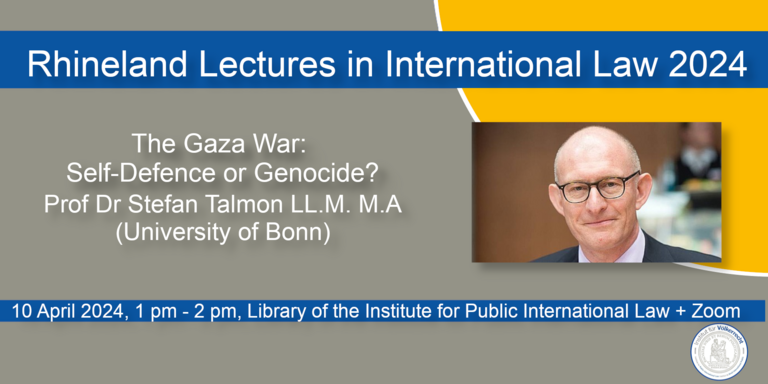
The Institute for Public International Law is pleased to announce that Professor Dr Stefan Talmon LL.M. M.A. will deliver the next Rhineland Lecture in International Law titled "The Gaza War: Self-Defence or Genocide?". The lecture will take place at the Institute's library on 10 April 2024, 13.00-14.00. Participants may join in person or via Zoom. A small coffee break afterwards will allow for an informal exchange over our Institute's delicious tea and coffee!
uni-bonn.zoom-x.de/j/64866048149
Meeting-ID: 648 6604 8149
Passcode: 200348
Dr Maria A Gwynn shares first-hand experience on transboundary water cooperation in high-level fora
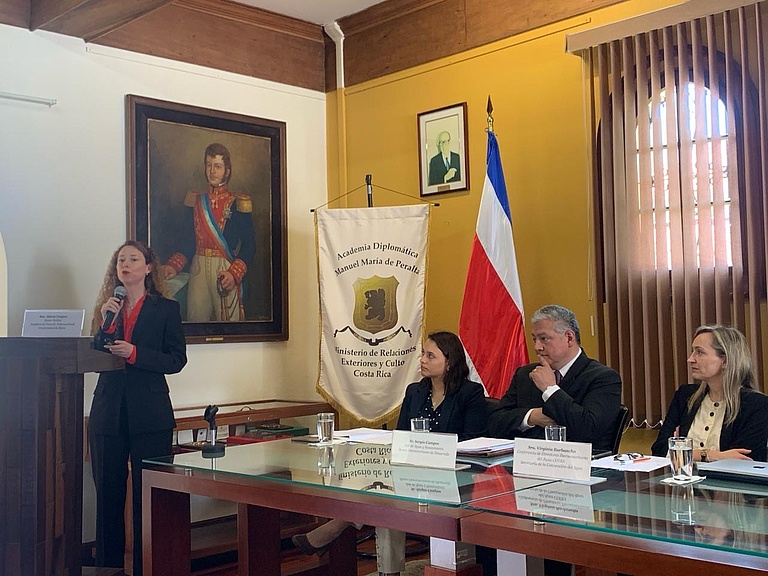
Following the high level political forum of Latin American Water Dialogues organised by ECLAC and IICA, where Dr. Maria A. Gwynn participated, the Ministry of Foreign Affairs of Costa Rica organised an International Workshop on the Convention on the Protection and Use of Transboundary Watercourses and International Lakes. The event took place at the Ministry of Foreign Affairs and was attended by UNECE´s Water Convention Secretariat and Costa Rica officials from the Ministries of Environment, Foreign Affairs, Water Direction, and members of the Legislative Assembly. Dr Maria A. Gwynn was an invited speaker, contributing with a talk on the topic of how the UN water conventions and international water law can enable transboundary water cooperation.
Interview with Julian Hettihewa on Völkerrechtsblog
The international law blog Völkerrechtsblog has published an extensive interview with Professor Talmon on Nicaragua's case against Germany before the International Court of Justice. In that interview, Professor Talmon discusses several legal aspects of the case as well as its implications for German foreign policy with Julian Hettihewa, who worked for the Institute for Public International Law until last year. The full interview is available here.
“Breaking Barriers, Building Bridges” – Dr Maria Gwynn speaks on water diplomacy in the upcoming century
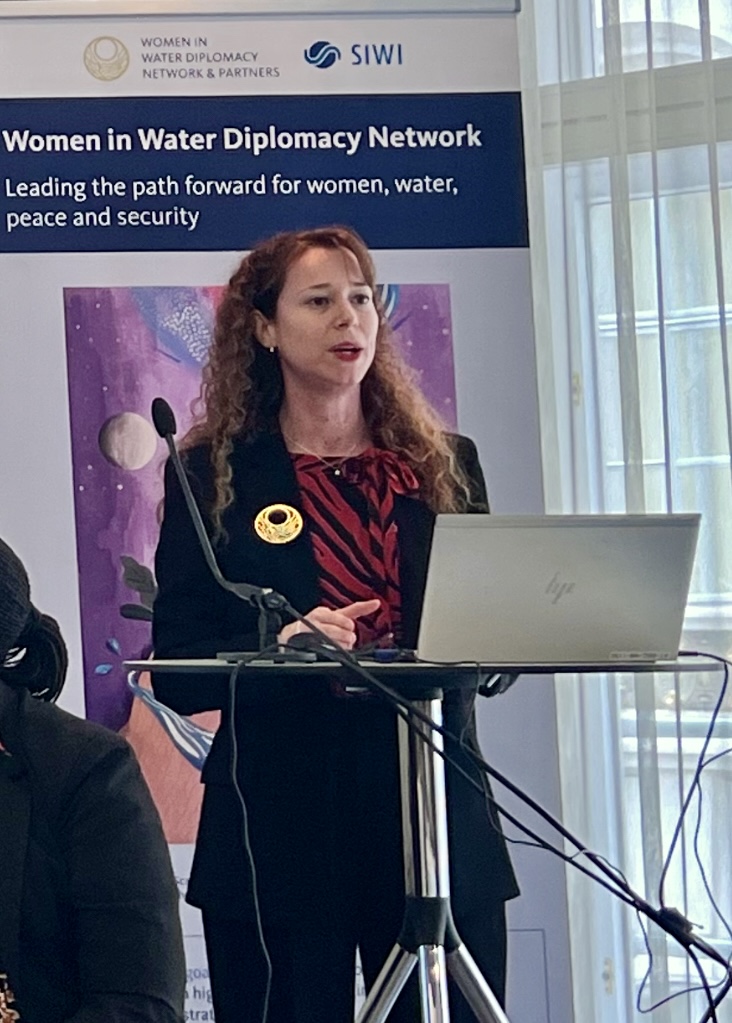
Dr Maria A. Gwynn was included in the Global Network for Women in Water Diplomacy and was an invited speaker for the international meeting that recently took place in Vienna. In the panel titled “Breaking Barriers, Building Bridges” she highlighted how water diplomacy will be crucial for the upcoming century; the importance of women in decision making positions, as well as compliance with legal framework for the utilization of international watercourses as enabling factors and processes leading to successful transboundary water cooperation. The meeting was organized by OSCE, Stockholm International Water Institute (SIWI), and the Environmental Law Institute (ELI).
Workshop in Milan
On 27 February, Dr Alexis Galán took part in the event "Institutionalising the Dialogue Between Law and Expertise - RULES Research Workshop" at Bocconi University in Milan.
Rhineland Lectures in International Law
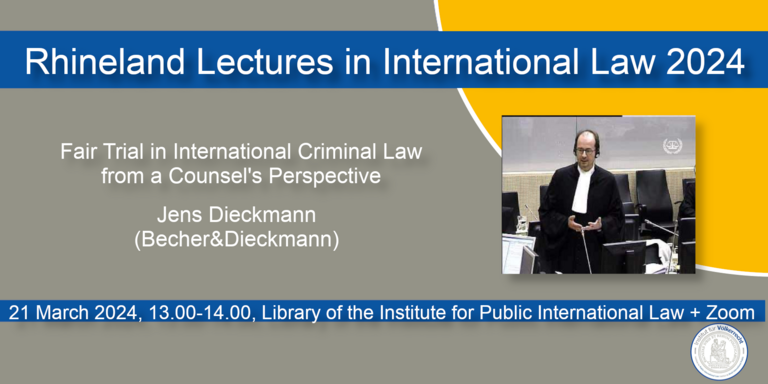
The Institute for Public International Law is delighted to offer another Rhineland Lecture in International Law in March. Jens Dieckmann (Becher&Dieckmann) will speak on "Fair Trial in International Criminal Law from a Counsel's Perspective". The event will take place in our Institute’s library on 21 March 2024, 13.00-14.00, and will be followed by a coffee and tea reception. Participation will also be possible via Zoom:
https://uni-bonn.zoom-x.de/j/64737212126?pwd=R21SU2gwbnRxL1hJWGl2dGhHY2xRQT09
Meeting-ID: 647 3721 2126
Passcode: 706595
Presentation, Middle East Study Centre (MESC)
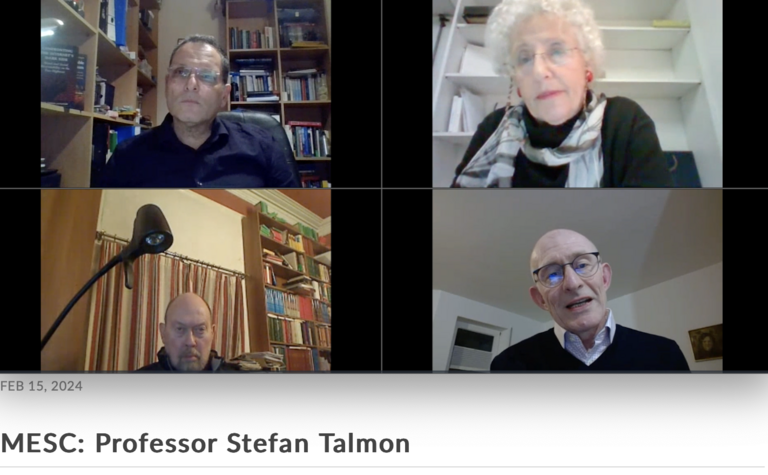
On February 14th, Professor Talmon gave an online presentation to the Middle East Study Centre (MESC) at the University of Hull. The lecture is available here.
Reading Group Meeting
The next meeting of the Bonner Reading Group will take place on February 21st, 5 pm, in the institute's library. We will discuss the ICJ case on the Allegations of Genocide under the Convention on the Prevention and Punishment of the Crime of Genocide (Ukraine v. Russian Federation). To prepare, please read the most recent judgment of the ICJ on the merits as well as the casenote by Marko Milanovic.
We will specifically discuss the following issues: Jurisdiction of the ICJ, provisional measures, the increased use of the Genocide Convention in the ICJ, the political aspects of ICJ judgments.
Rhineland Lectures in International Law
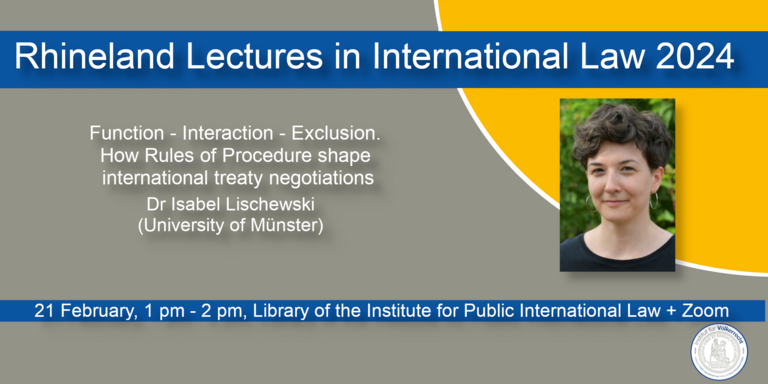
The Institute for Public International Law is delighted to offer our first Rhineland Lecture in International Law of the year. Dr Isabel Lischewski (University of Münster) will speak on "Function - Interaction - Exclusion. How Rules of Procedure shape international treaty negotiations". The event will take place in our Institute’s library on 21 February, 1 pm - 2 pm, and will be followed by a coffee and tea reception. Participation will also be possible via Zoom.
https://uni-bonn.zoom-x.de/j/67658060080?pwd=RFNQcHAyR2tmWmJVRityM2F5SlRSQT09
Meeting-ID: 676 5806 0080
Kenncode: 065215
Interviews zur Entscheidung des Internationalen Gerichtshofs über einstweiligen Rechtsschutz im Verfahren zwischen Südafrika und Israel unter der Völkermordkonvention
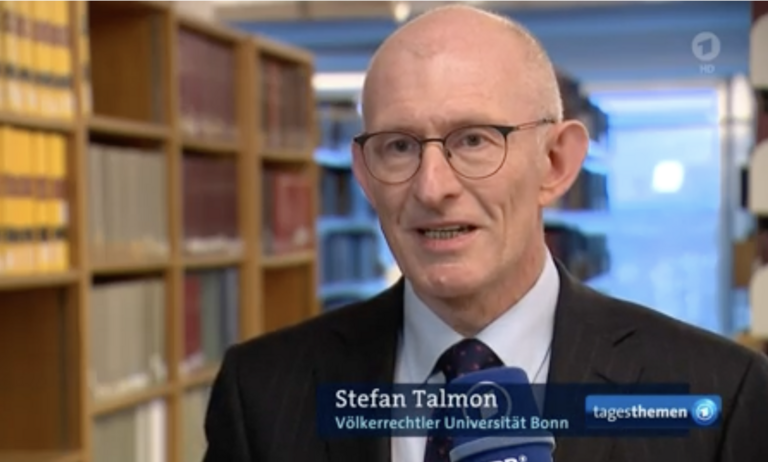
Am 26. Januar 2024 gab Professor Talmon in den Nachrichtensendungen heute und tagesthemen eine erste Einschätzung zur Entscheidung des Internationalen Gerichtshofs ab, in dem einstweilige Anordnungen gegen Israel erlassen wurden. In dem Verfahren, das von Südafrika angestrengt wurde, werden Israel Verstöße gegen die Völkermordkonvention vorgeworfen.
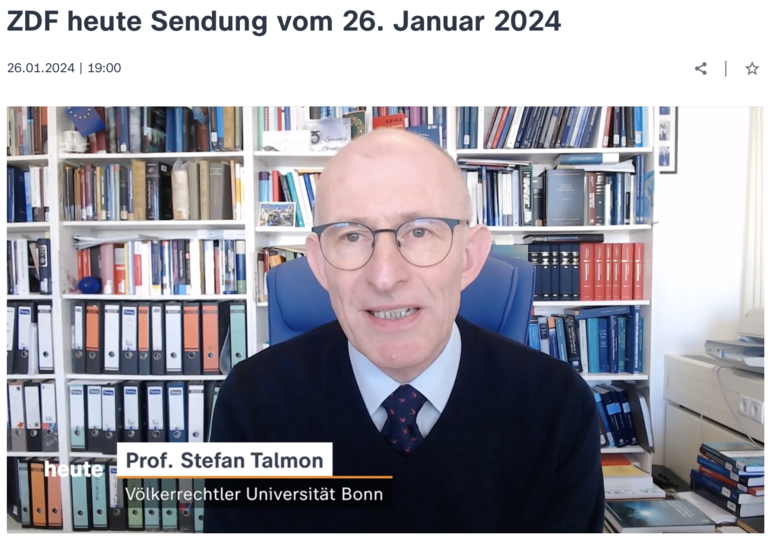
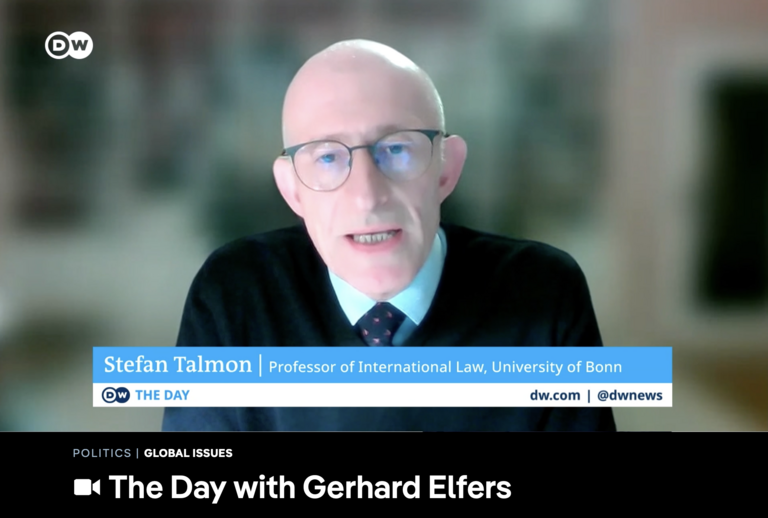
Proseminar im Sommersemester 2024
Ich werde im Sommersemester 2024 ein Proseminar veranstalten zum Thema
Deutschland und der (Ständige) Internationale Gerichtshof
In den letzten 100 Jahren ist Deutschland in den verschiedensten Verfahren vor dem Internationalen Gerichtshof und dessen Vorgänger dem Ständigen Internationalen Gerichtshof als Streitpartei oder im Rahmen von Rechtsgutachtenverfahren beteiligt gewesen. Einige der Fälle, wie S.S. Wimbeldon, Factory at Chorzów oder North Sea Continental Shelf, gehören zu den „Klassikern des Völkerrechts“. Im Proseminar sollen diese Fälle vorgestellt werden. Ausgehend vom politischen und geschichtlichen Hintergrund soll die juristische Streitfrage erläutert und die Positionen der Parteien sowie die Entscheidung des Gerichtshofs dargestellt werden. Des Weiteren sollen die Entscheidungen des Gerichtshofs in diesen Fällen in die Völkerrechtsentwicklung generell eingeordnet werden.
Mögliche Themen sind unter anderem:
- Questions of jurisdictional immunities of the State and measures of constraint against State-owned property (Germany v. Italy) (pending)
- Jurisdictional Immunities of the State (Germany v Italy, Greece intervening) (2012)
- Certain Property (Liechtenstein v. Germany) (2005)
- Legality of Use of Force (Serbia and Montenegro v Germany) (2004)
- LaGrand (Germany v US) (2001)
- Fisheries Jurisdiction (Germany v Iceland) (1974)
- North Sea Continental Shelf cases (Federal Republic of Germany/Denmark and Federal Republic of Germany/Netherlands) (1968)
- Polish Agrarian Reform and the German Minority (Germany v Poland) (1933)
- Administration of the Prince von Pless (Germany v Poland) (1933)
- Customs Régime between Germany and Austria Advisory Opinion (1931)
- Access to German Minority Schools in Upper Silesia Advisory Opinions (1931)
- Territorial Jurisdiction of the International Commission of the River Oder (‘Six Governments’ v Poland) (1929)
- Rights of Minorities in Upper Silesia (Minority Schools) (Germany v Poland) (1928)
- Factory at Chorzów (Germany v Poland) (1927/28)
- Certain German interests in Polish Upper Silesia (Germany v Poland) (1926)
- Acquisition of Polish Nationality Advisory Opinion (1923)
- German Settlers in Poland Advisory Opinion (1923)
- S.S. Wimbledon (United Kingdom et al v Germany) (1923)
Das Proseminar wird am 3./4. Mai 2024 als Blockveranstaltung in der Bibliothek des Instituts für Völkerrecht (Ostturm, 4. Etage) stattfinden.
In der letzten Woche des Wintersemesters 2023/2024 – am Freitag, dem 02.02.2024 von 14 Uhr s.t. bis 17 Uhr – erfolgt eine kompakte Einführung in die Grundlagen des wissenschaftlichen Arbeitens zur Vorbereitung auf das Seminar.
Für die Bearbeitung der Proseminararbeit sind drei Wochen vorgesehen. Die Bearbeitungszeit liegt in der vorlesungsfreien Zeit. Die Themen werden am 05.02.2024 per Email ausgegeben. Die Arbeiten sind bis spätestens 05.04.2024 einzureichen.
Eine Vorbesprechung für das Seminar findet statt am
Dienstag, dem 23. Januar 2024, um 18:00 Uhr (s.t.)
in der Bibliothek des Instituts für Völkerrecht (Ostturm, 4. Etage).
Die Teilnehmerzahl ist auf 15 Studierende begrenzt. Besondere Vorkenntnisse werden nicht erwartet.
Interessierte Studierende können sich in der Zeit vom 23. bis einschließlich 25. Januar 2024 über das zentrale Portal des Fachbereichs zur Vergabe von Proseminarplätzen (https://seminarvergabe.jura.uni-bonn.de/Startseite.php) für eine Teilnahme am Proseminar anmelden.
Bei Fragen können Sie sich gerne an Frau Fine Hartmann (Tel: 0228 73-9281; E-Mail: fine.hartmann@~@uni-bonn.de) wenden.
Prof. Dr. Stefan Talmon
Seminar im Sommersemester 2024
Ich werde im Sommersemester 2024 ein Seminar veranstalten für den Schwerpunktbereich XI (neue Prüfungsordnung) und die Schwerpunktbereiche 6 und 8 (alte Prüfungsordnung) zum Thema
Der Gaza-Krieg und Nahostkonflikt im Lichte des Völkerrechts
Seit dem Angriff der Hamas und anderer Terrororganisationen auf Israel am 7. Oktober 2023 und der israelischen Militäraktion im Gazastreifen ist der Nahostkonflikt wieder in das Blickfeld einer weiteren Öffentlichkeit getreten. Das Seminar widmet sich den völkerrechtlichen Fragen, die der Nahostkonflikt in den letzten 80 Jahren und der zweite Gaza-Krieg aufgeworfen haben.
Mögliche Themen sind unter anderem:
- Der Erste Weltkrieg, der Völkerbund und das britische Mandat für Palästina
- Die Vorschläge der Vereinten Nationen zur Beilegung des Nahostkonflikts von der Teilungsresolution 181 (II) der UN-Generalversammlungsresolution 181 bis zur Zwei-Staaten-Lösung
- Die Gründung des Staates Israels und die (Nicht-)Anerkennung und der Boykott Israels durch arabische und islamische Staaten
- Der erste arabisch-israelische Krieg 1948-1949 (einschließlich Rechtsstellung der Konfliktparteien, anwendbares Kriegsrecht, Waffenstillstand, territoriale Lage nach Ende des Krieges)
- Die Rechtsstellung der palästinensischen Flüchtlinge und die United Nations Relief and Works Agency for Palestine Refugees in the Near East (UNRWA)
- Das Selbstbestimmungsrecht des palästinensischen Volkes
- Die Palästinensische Befreiungsbewegung (PLO) (Rechtsstellung, Terrororganisation oder Vertreterin der palästinensischen Volkes, Vertretung in den Vereinten Nationen)
- Der Sechstagekrieg 1967 (einschließlich Angriff/präventive Selbstverteidigung, Waffenstillsand, territoriale Lage nach Ende der Kampfhandlungen)
- Die Rechtsstellung Jerusalems von 1948 bis heute (einschließlich der Annexion von Ostjerusalem durch Israel, die Rechtsstellung der in Ostjerusalem lebenden Palästinenser)
- Die israelische Besetzung des Westjordanlandes, Ostjerusalems und des Gazastreifens (einschließlich der israelischen Siedlungspolitik, Intifada I und II, der Frage der Besetzung des Gazastreifens nach dem israelischen Rückzug 2005, der Vorwurf der Apartheid)
- Die Camp David-Abkommen 1978
- Israels Invasionen und Besetzungen im Libanon, 1978-2000 (einschließlich des Massakers von Sabra and Shatila)
- Die israelische Annexion des syrischen Golan
- Der Bau einer Schutzmauer durch Israel in den palästinensischen besetzten Gebieten des Westjordanlandes und das Rechtsgutachten des Internationalen Gerichtshofs
- Der erste Gaza-Krieg (2008-2009)
- Die israelische Blockade des Gazastreifens und der der internationales Gaza-Friedens-Konvoi (2010)
- Der zweite Gaza-Krieg (2023-2024) (einschließlich der Rechtsstellung der Hamas-Kämpfer, Israels Recht auf Selbstverteidigung, Kriegsverbrechen)
- Der Vorwurf des Völkermords gegen Israel und das Verfahren vor dem Internationalen Gerichtshof (einschließlich der Intervention durch andere Vertragsparteien der Völkermordkonvention)
Das Seminar wird am 10./11. Mai 2024 als Blockveranstaltung in der Bibliothek des Instituts für Völkerrecht (Ostturm, 4. Etage) stattfinden.
Die Bearbeitungszeit für die Hausarbeit beträgt sechs Wochen und liegt in der vorlesungsfreien Zeit. Die Ausgabe der Themen erfolgt ab 05.02.2024 beim Sekretariat des Instituts.
Eine Vorbesprechung für das Seminar findet statt am
Dienstag, dem 23. Januar 2024, um 18:30 Uhr
in der Bibliothek des Instituts für Völkerrecht (Ostturm, 4. Etage).
Die Teilnehmerzahl ist auf 15 Studierende begrenzt. Das Seminar steht auch Master- und Begleitfachstudierenden offen. Völkerrechtliche Grundkenntnisse sind hilfreich, aber nicht Voraussetzung.
Interessierte Studierende können sich in der Zeit vom 23. bis einschließlich 25. Januar 2024 über das zentrale Portal des Fachbereichs zur Vergabe von Seminarplätzen (https://seminarvergabe.jura.uni-bonn.de/Startseite.php) für eine Teilnahme am Seminar anmelden.
Bei Fragen können Sie sich gerne an Herrn Julian Schepers (Tel: 0228 73-9681; E-Mail: julian.schepers@~@uni-bonn.de) wenden.
Prof. Dr. Stefan Talmon
Interviews in deutschen Medien
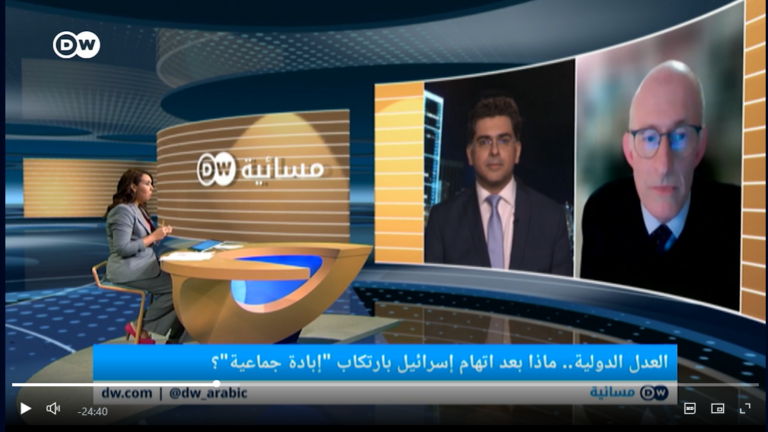
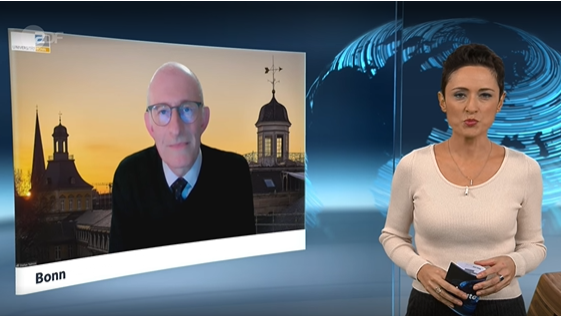
Im Rahmen unterschiedlicher Medienformate gab Professor Talmon seine Einschätzung zum Verfahren zwischen Südafrika und Israel vor dem Internationalen Gerichtshof. Unter anderem gab er Fernsehinterviews im deutschsprachigen heute journal sowie dem arabischen Kanal der Deutschen Welle.
Bonner Reading Group, 18 January, 4.15 pm
We are happy to announce another session of the Bonner Reading Group, which will take place on Thursday, 18 January, 4.15 pm. We will meet in the institute's library (4th floor) to discuss the following article:
Maksym Vishchyk/Jeremy Pizzi, Compromises on Territory, Legal Order, and World Peace: The Fate of International Law Lies on Ukraine’s Borders (6 October 2023), Just Security
The Reading Group is open for everyone, prior registration is not necessary. If you have any questions, please contact Fine Hartmann.
Interview im Völkerrechtspodcast
Im aktuellen Völkerrechtspodcast #32 "Kriegsvölkerrecht: Gaza" ordnet Professor Stefan Talmon die Kampfhandlungen der Hamas und Israels aus Perspektive des jus ad bellum und des jus in bello völkerrechtlich ein.
Der Beitrag kann hier nachgehört werden.
Talk at the United Nations in Geneva
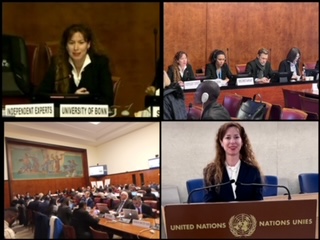
Dr. Maria Gwynn was invited as legal expert and speaker in international meetings organised by UNECE, which took place at the United Nations in Geneva during the first week of December. In her first talk, Dr. Gwynn spoke about how energy production revenues can be used to strengthen transboundary cooperation and management activities in a basin. In her second talk, she spoke about the the role of hydropower for the Task Force on Water-Food-Energy and Ecosystem (WEFE nexus), and argued for the importance of ensuring energy and water security in times of droughts. In doing so, she gave a detailed account of one of the world's successful examples on transboundary water cooperation, implemented in the South American region during her time as Governing Council member of Itaipu. She also received an honorary appointment by the International Association for Water Law (AIDA) as the Association's representative to UN water.
Rhineland Lectures in International Law
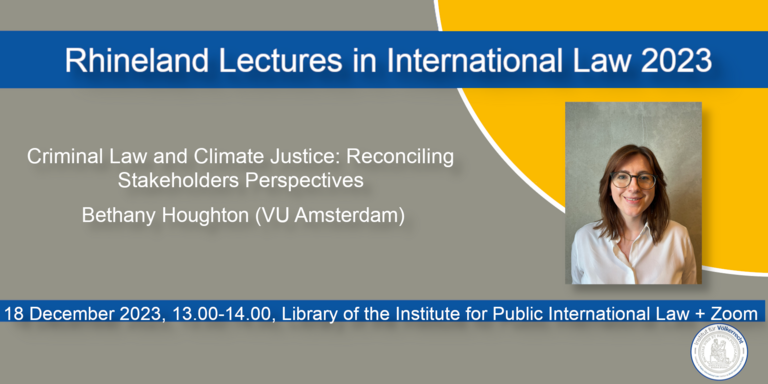
The Institute for Public International Law is delighted to offer another Rhineland Lecture in International Law in December. Bethany Houghton (VU Amsterdam) will speak on "Criminal Law and Climate Justice: Reconciling Stakeholders Perspectives of a Criminal Climate Law with Principles of Climate and Criminal Justice". The event will take place in our Institute’s library on 18 December 2023, 13.00-14.00, and will be followed by a coffee and tea reception. Participation will also be possible via Zoom:
uni-bonn.zoom-x.de/j/67879208847
Meeting-ID: 678 7920 8847
Passcode: 112895
Rhineland Lectures in International Law
The Institute for Public International Law is delighted to offer a second Rhineland Lecture in International Law this month. Dr Elisabeth Hoffberger-Pippan (Peace Research Institute Frankfurt) will speak on "Autonomous Weapon Systems, Artificial Intelligence and Humanitarian Law". The event will take place in our Institute’s library on 30 November 2023, 13.00-14.00, and will be followed by a coffee and tea reception. Participation will also be possible via Zoom:
uni-bonn.zoom-x.de/j/67199583238
Meeting-ID: 671 9958 3238
Passcode: 522230
Rhineland Lectures in International Law
The Institute for Public International Law is pleased to announce that Professor Dr Julian Scheu (University of Cologne) will deliver the next Rhineland Lecture in International Law titled "Climate Change, Human Rights, and the Redirection of Global Capital Flows". The lecture will take place at the Institute's library on 21 November 2023, 13.00-14.00. Participants may join in person or via Zoom. A small coffee break afterwards will allow for an informal exchange over our Institute's delicious tea and coffee!
uni-bonn.zoom-x.de/j/63185129798
Meeting-ID: 631 8512 9798
Passcode: 730578
Publication on the Binational Entity ITAIPU
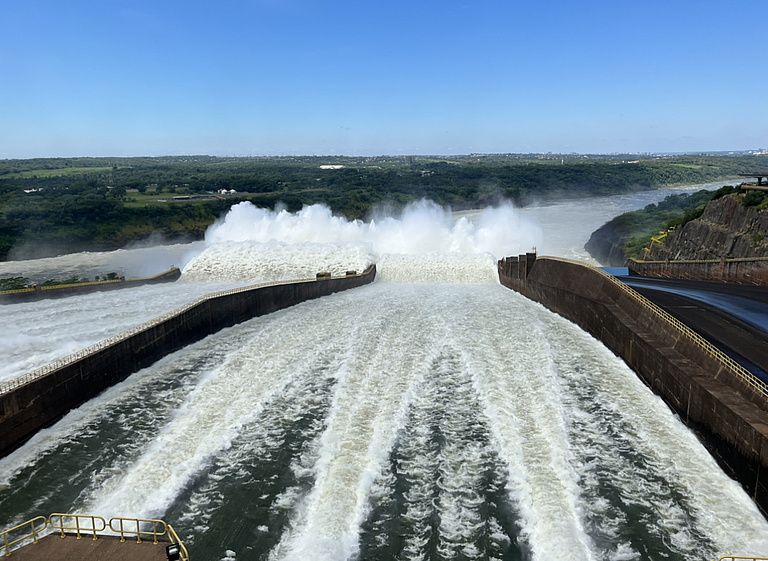
On 13 November 2023, Dr Maria A Gwynn, Senior Research Fellow at the Institute for Public International Law, published an article on "International law and transboundary dams: lessons learned from the Binational Entity ITAIPU (Brazil and Paraguay)" in Frontiers in Climate. The text forms part of a special issue titled "Doubling Global Hydropower Capacity by 2050 – What about the Transboundary Dimension?". You access the publication here.
Publication on the Principle of Precautions
On 8 November 2023, our PhD student Yunus Emre Gul published a blogpost titled "The Application of the Principle of Precautions within the Context of Northern Gaza: A Reminder" on Opinio Juris. "Instead of adhering to the adage ‘silent leges inter arma’", Yunus writes, "our objective should be ‘lex sola sit inter arma’." You can access the text here.
Paraguayan newspaper reports on Rhineland Lecture
The Paraguayan nation-wide circulation newspaper Diario ABC Color reported on Dr Maria A. Gwynn's Rhineland Lecture in International Law. Dr Gwynn, Senior Research Fellow at the Institute for Public International Law, spoke about international law and transboundary dams on 19 October 2023. The article has been published in print (Impreso 29/10/23 | Diario ABC Color | Suplemento Económico | p3) and can also be accessed online.
Presentation in Rome
Professor Talmon has been invited to give a talk on the 'Conflict in Ukraine and the Duty of Non-recognition' in Rome on 10 November 2023. Professor Talmon's presentation is part of the conference on 'The Duty of Non-Recognition in Contemporary International Law: The Conflict in Ukraine and Beyond', which is organised by Sapienza Università di Roma and the University of Ferrara. The programme may be accessed here.
Talk at the 5th OPEC-OPEC Fund Annual Legal Workshop
On 23 October 2023, Professor Talmon will give a presentation on ‘Non-treaty Sources for Climate Change Obligations and Legal Consequences’ at the 5th OPEC-OPEC Fund Annual Legal Workshop on Responsibility of States regarding Climate Change, Vienna. The programme may be found here.
Neuigkeiten aus früheren Jahren finden Sie im Nachrichtenarchiv. / For news from previous years, please see our News Archive.
